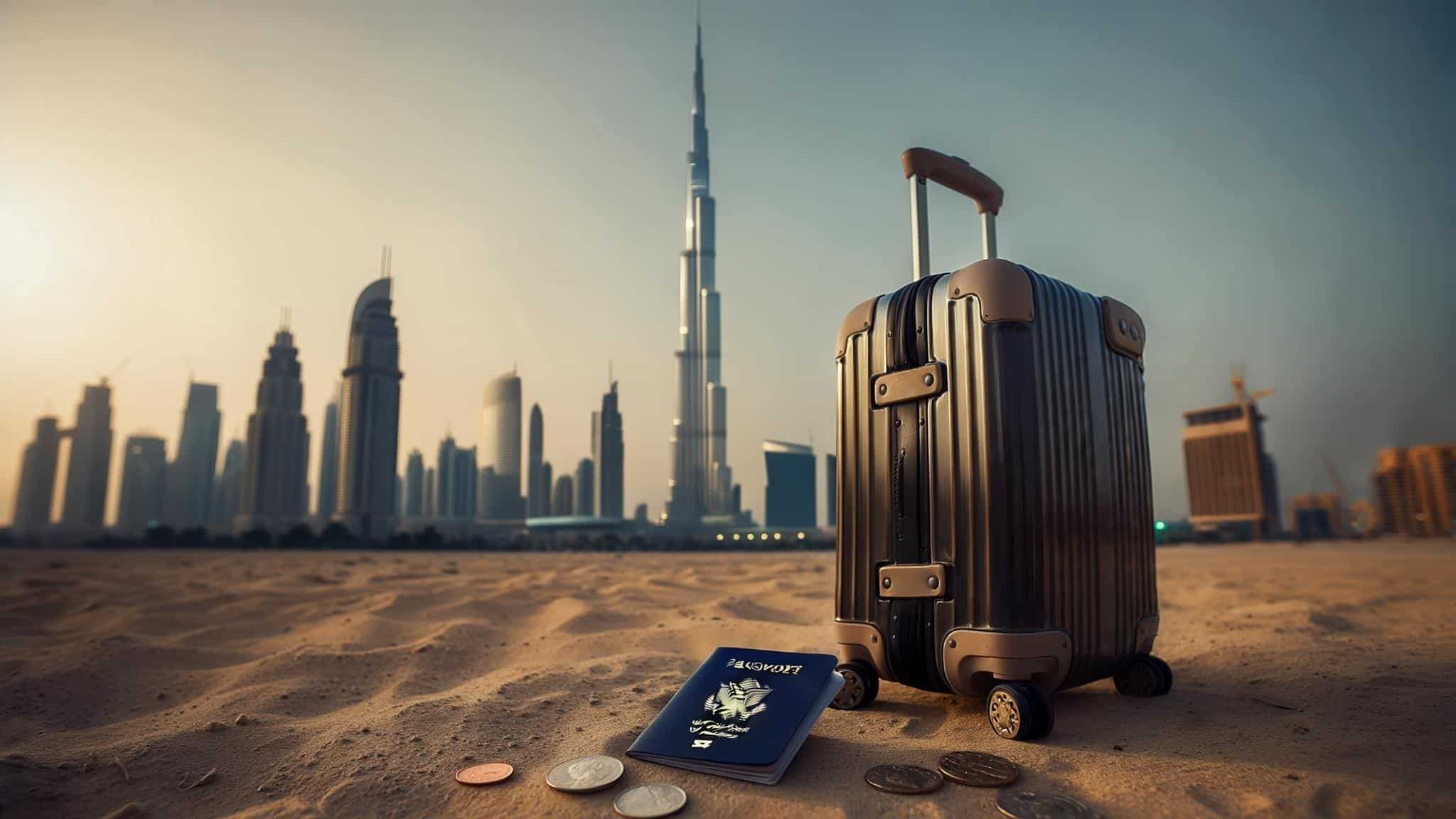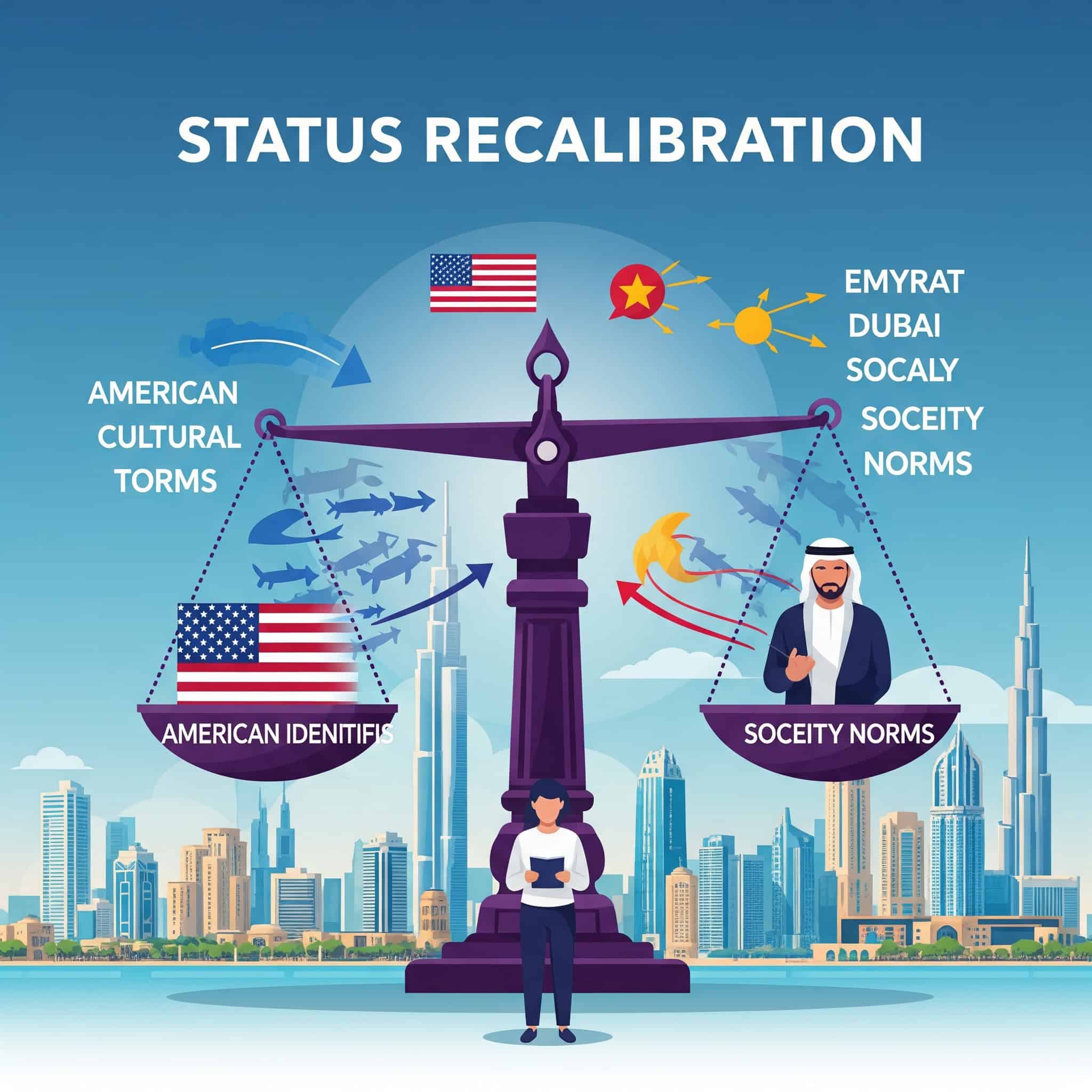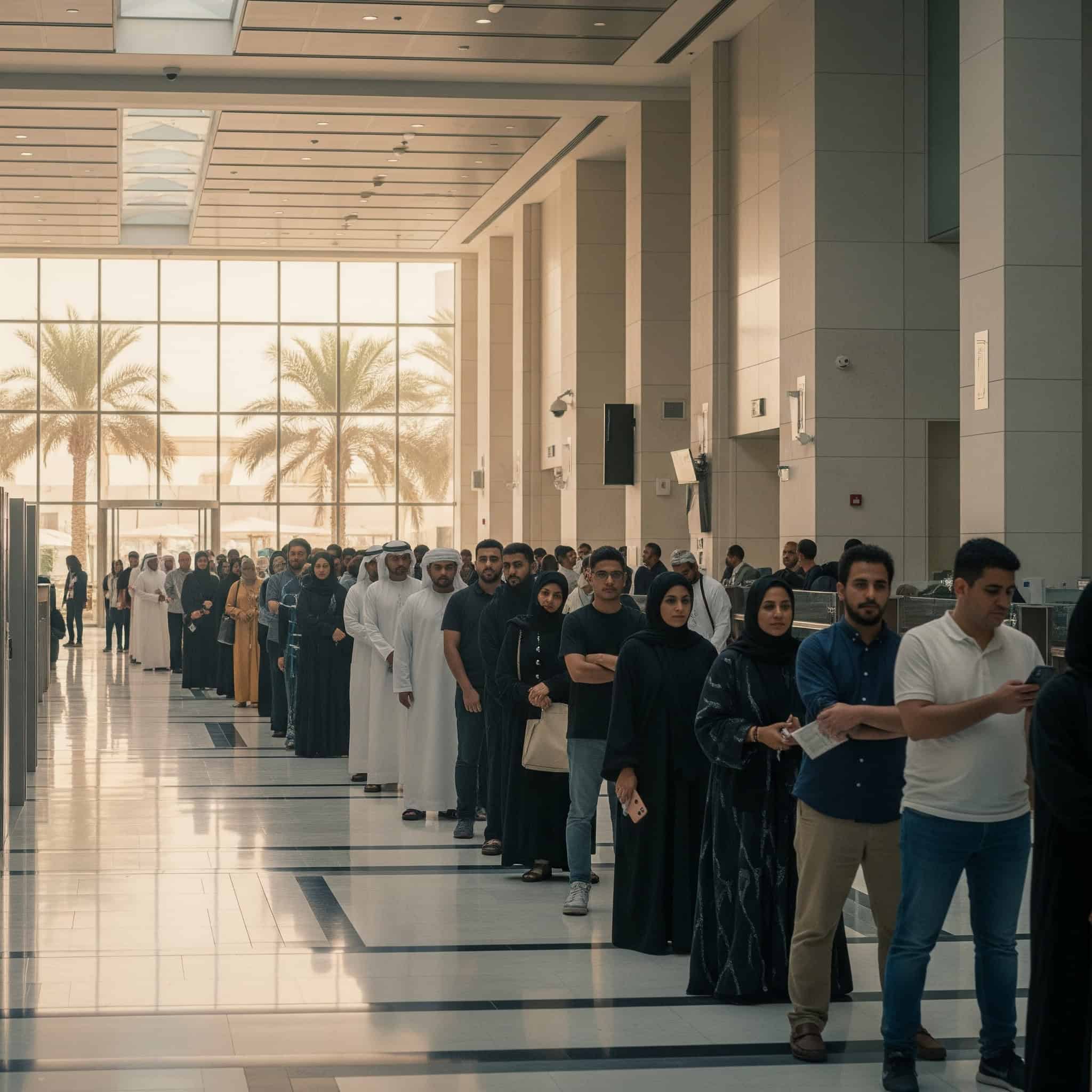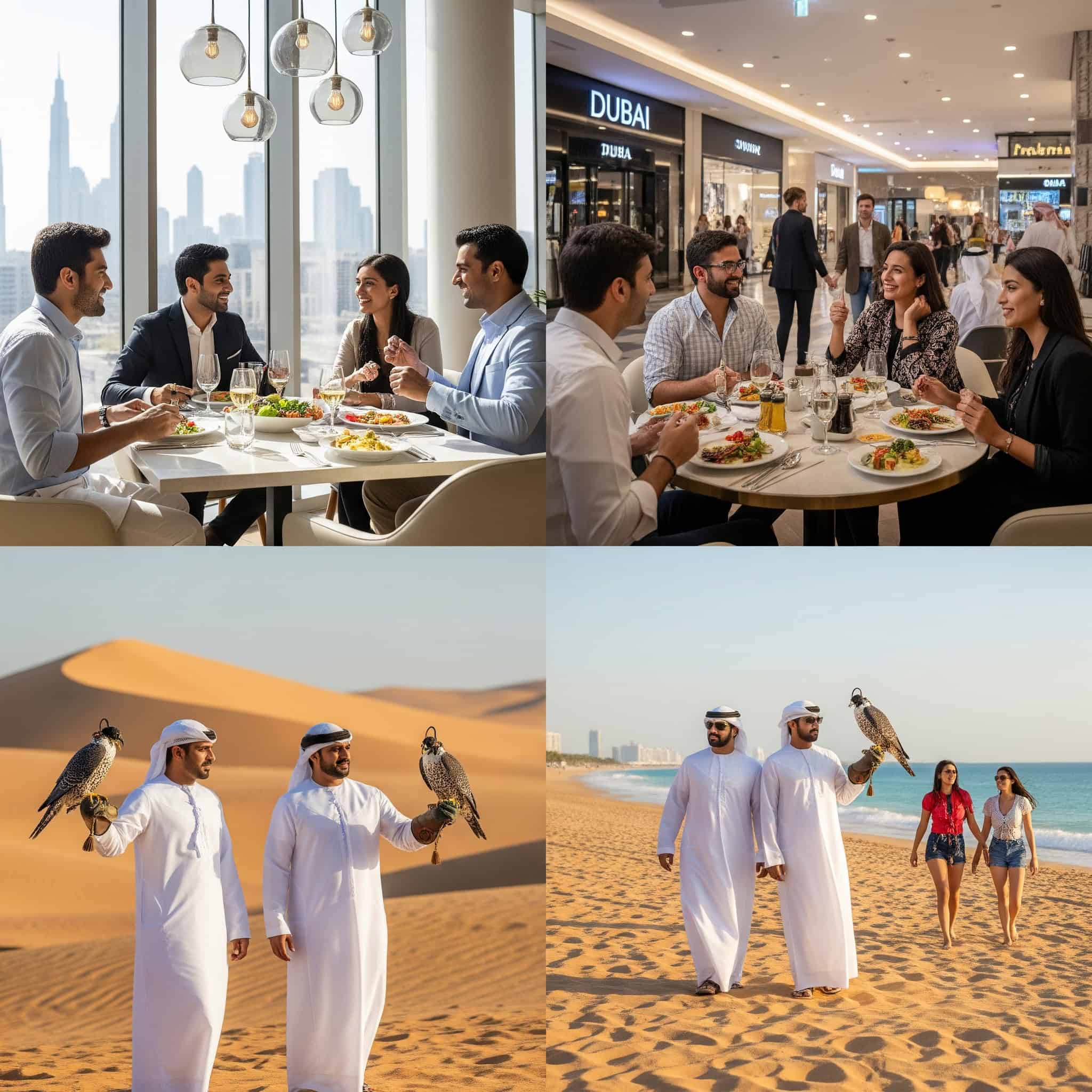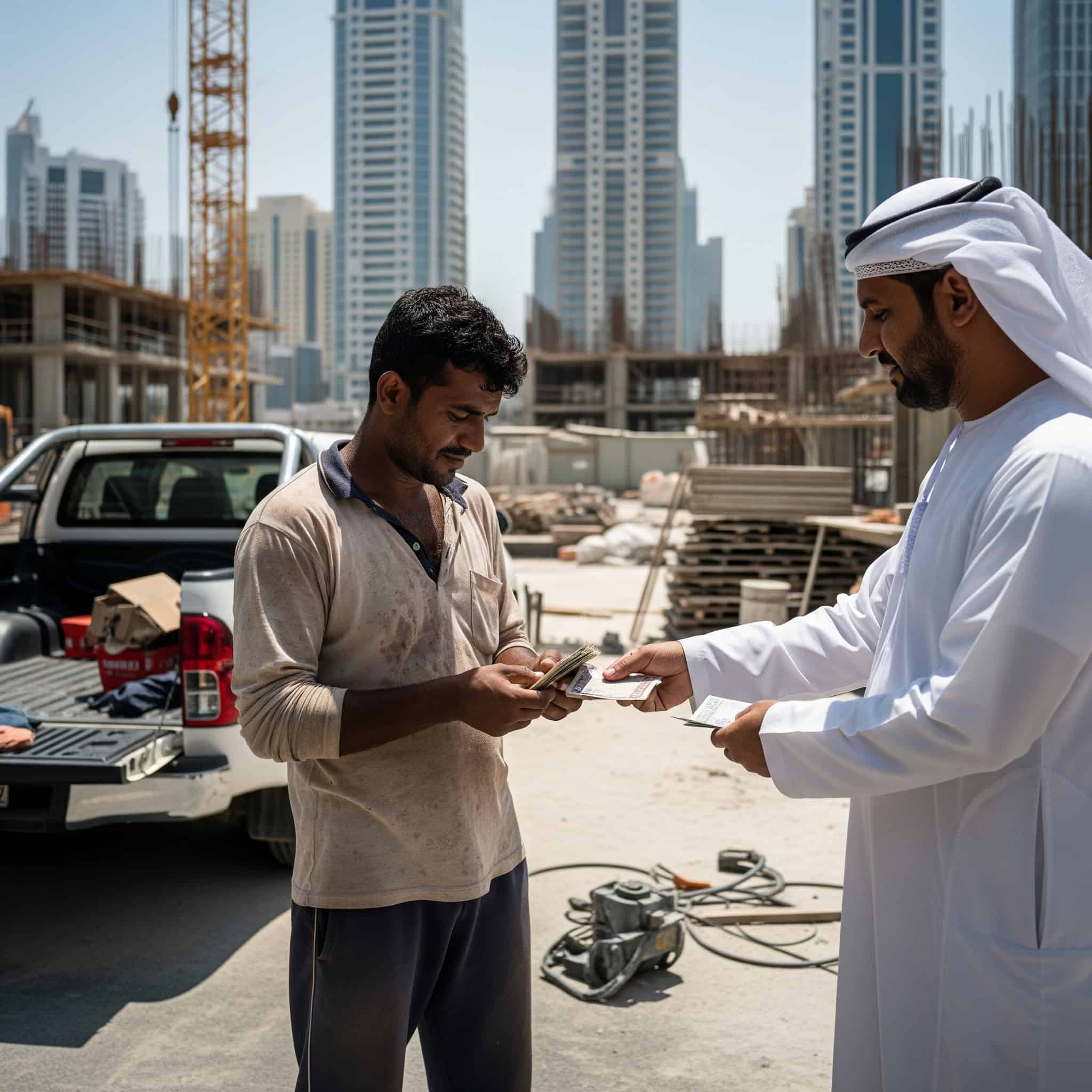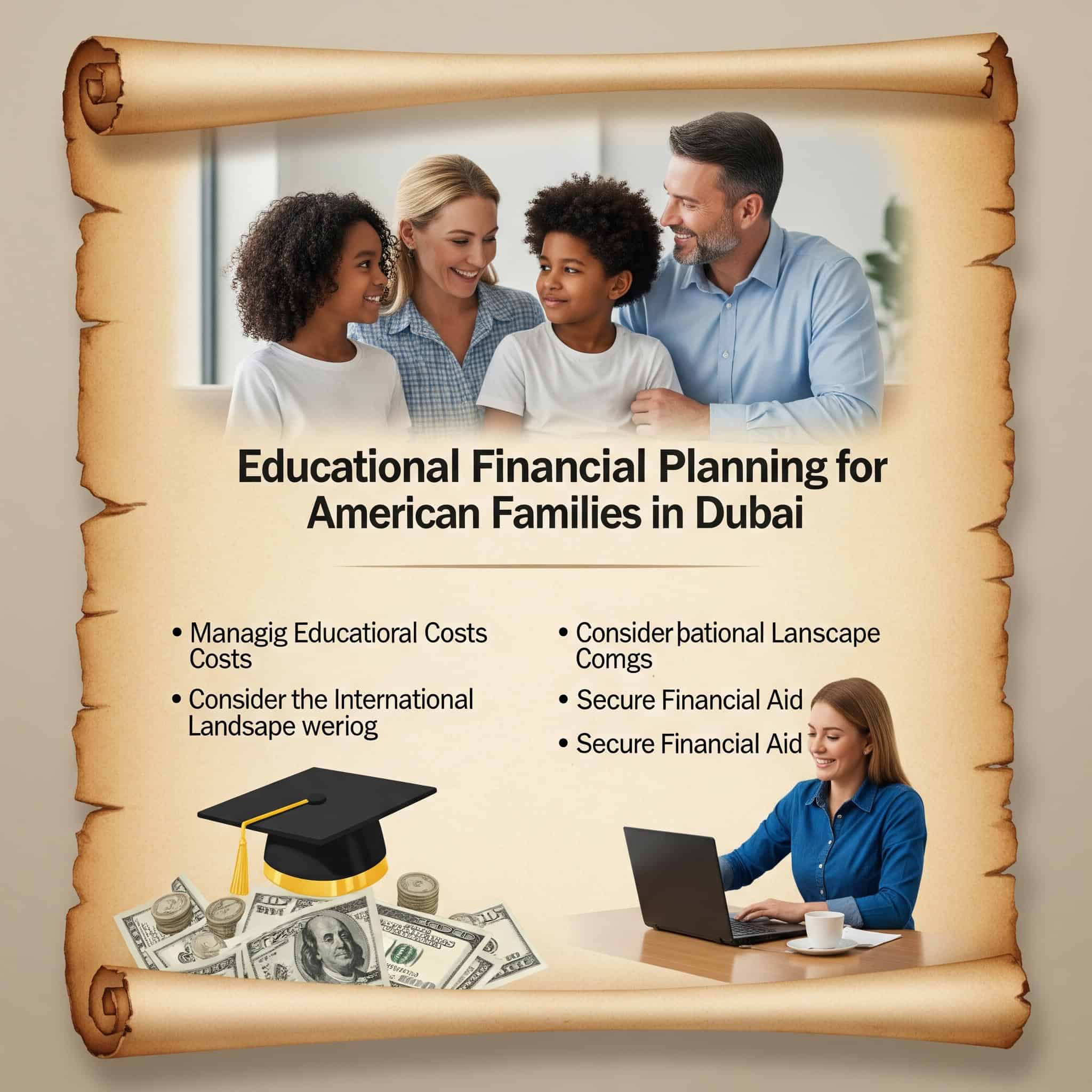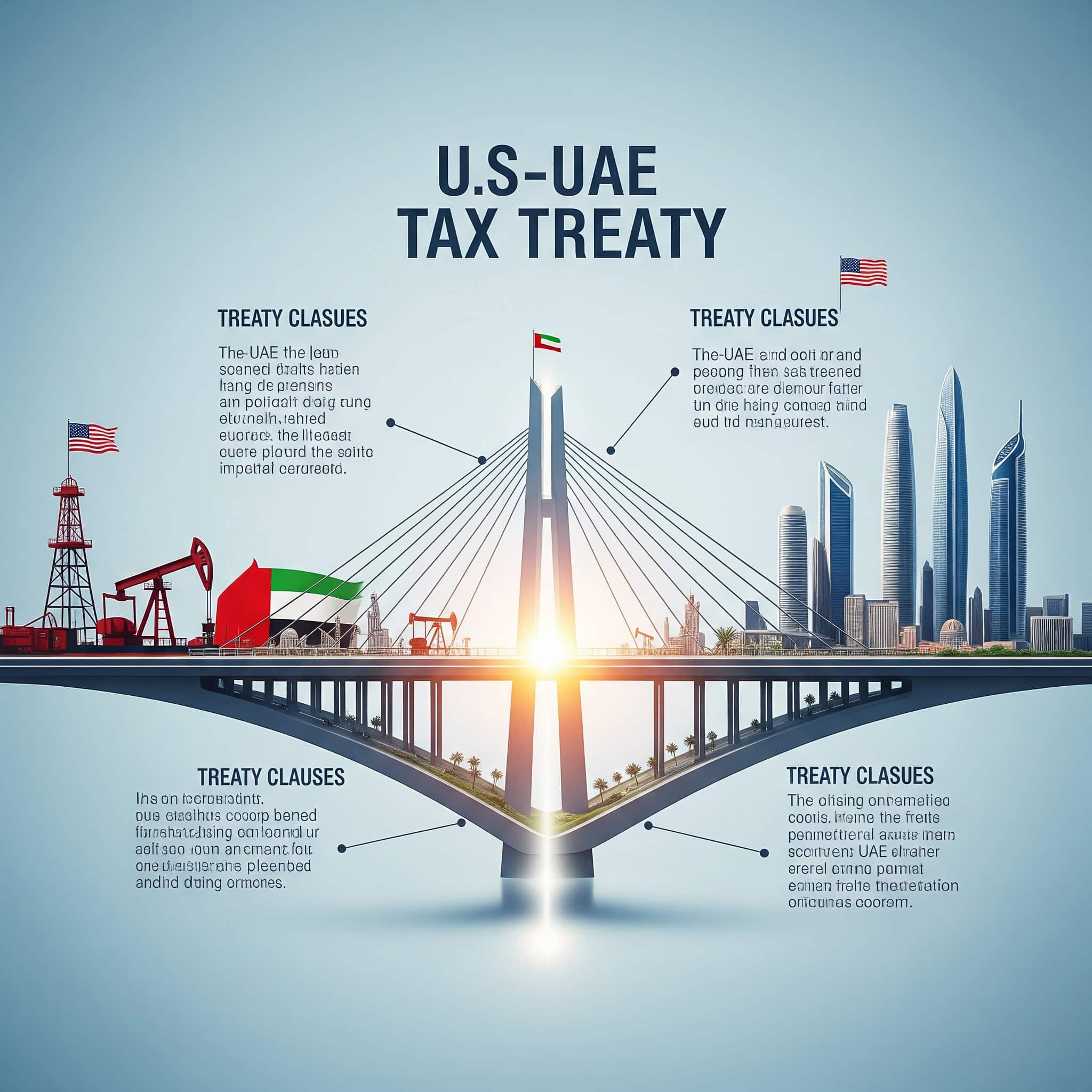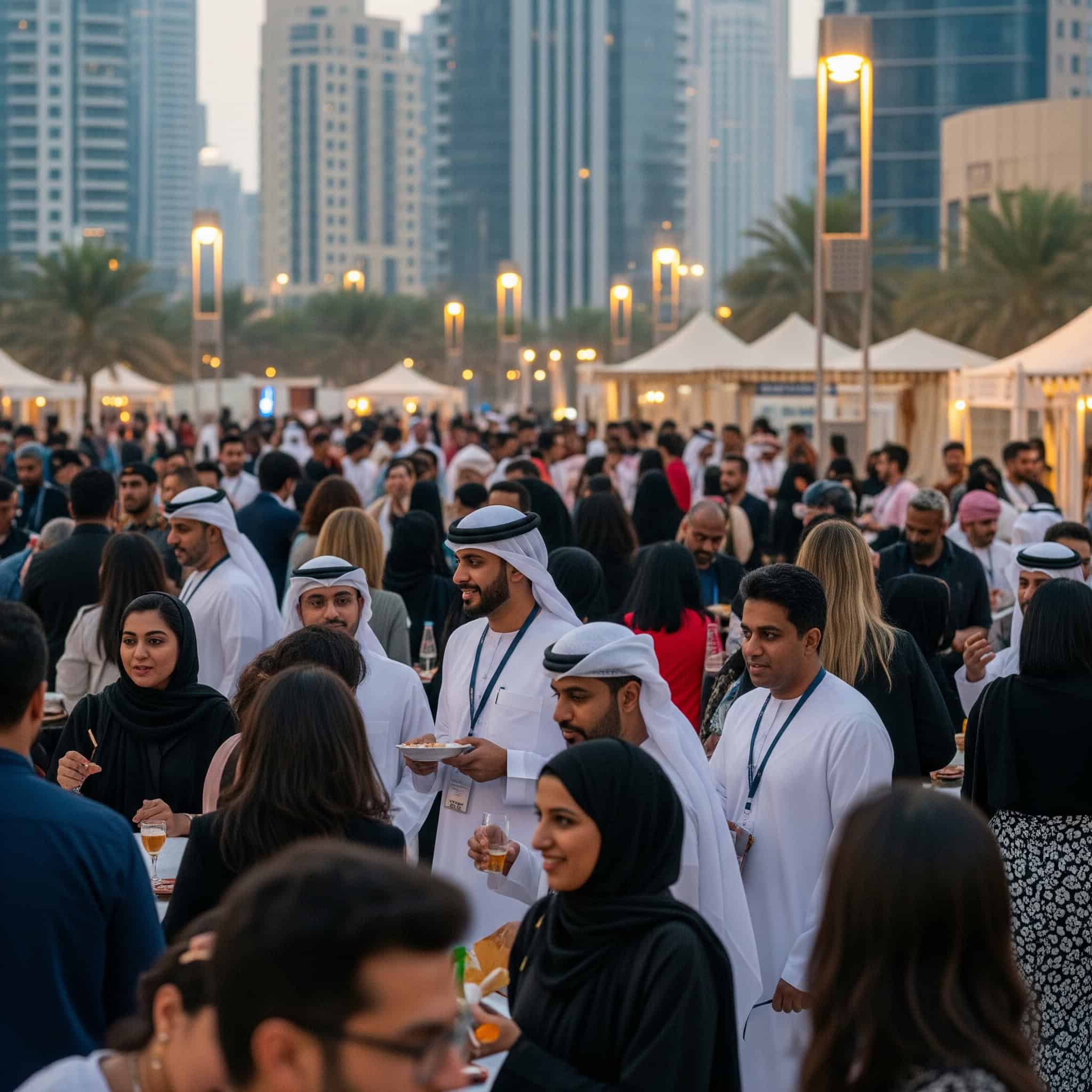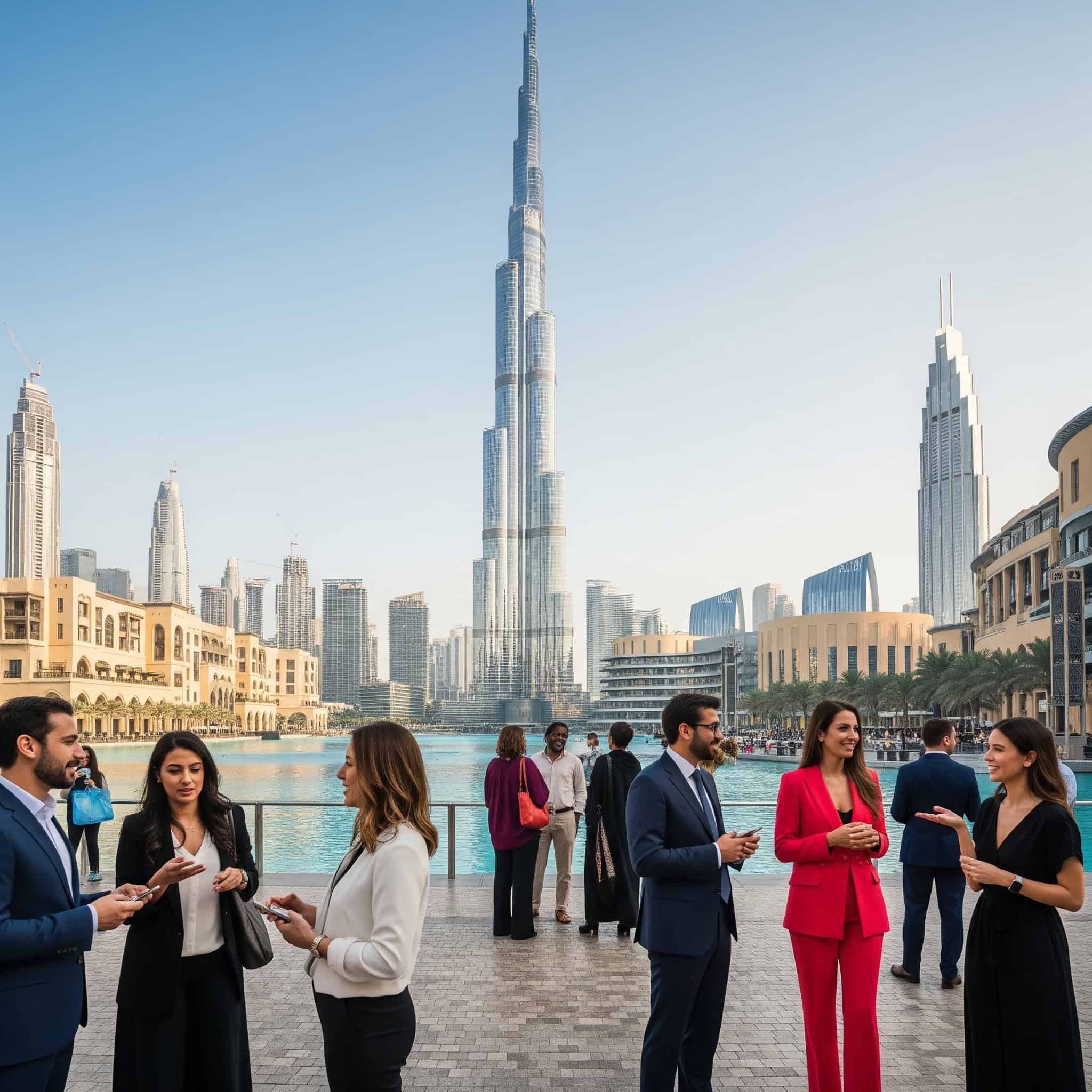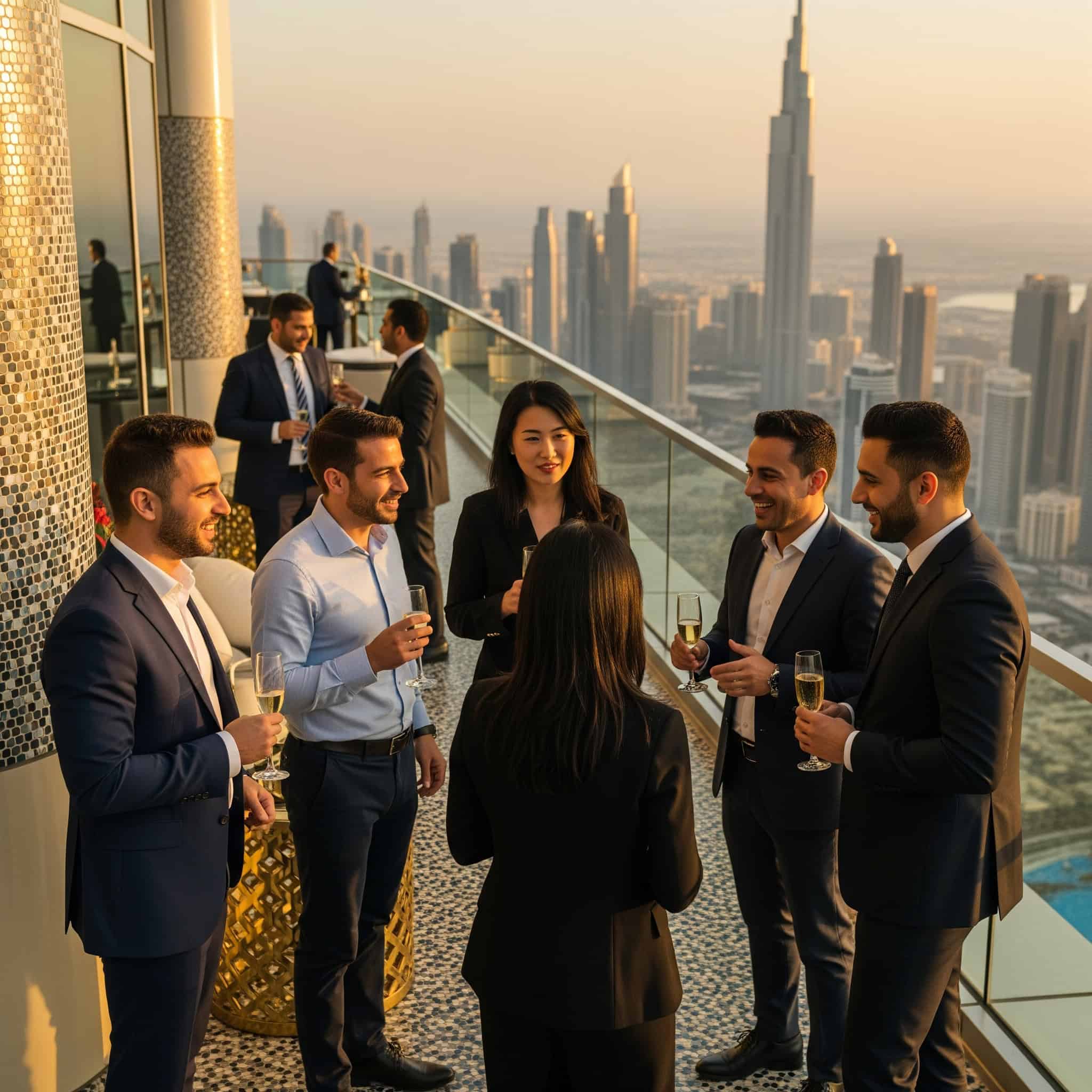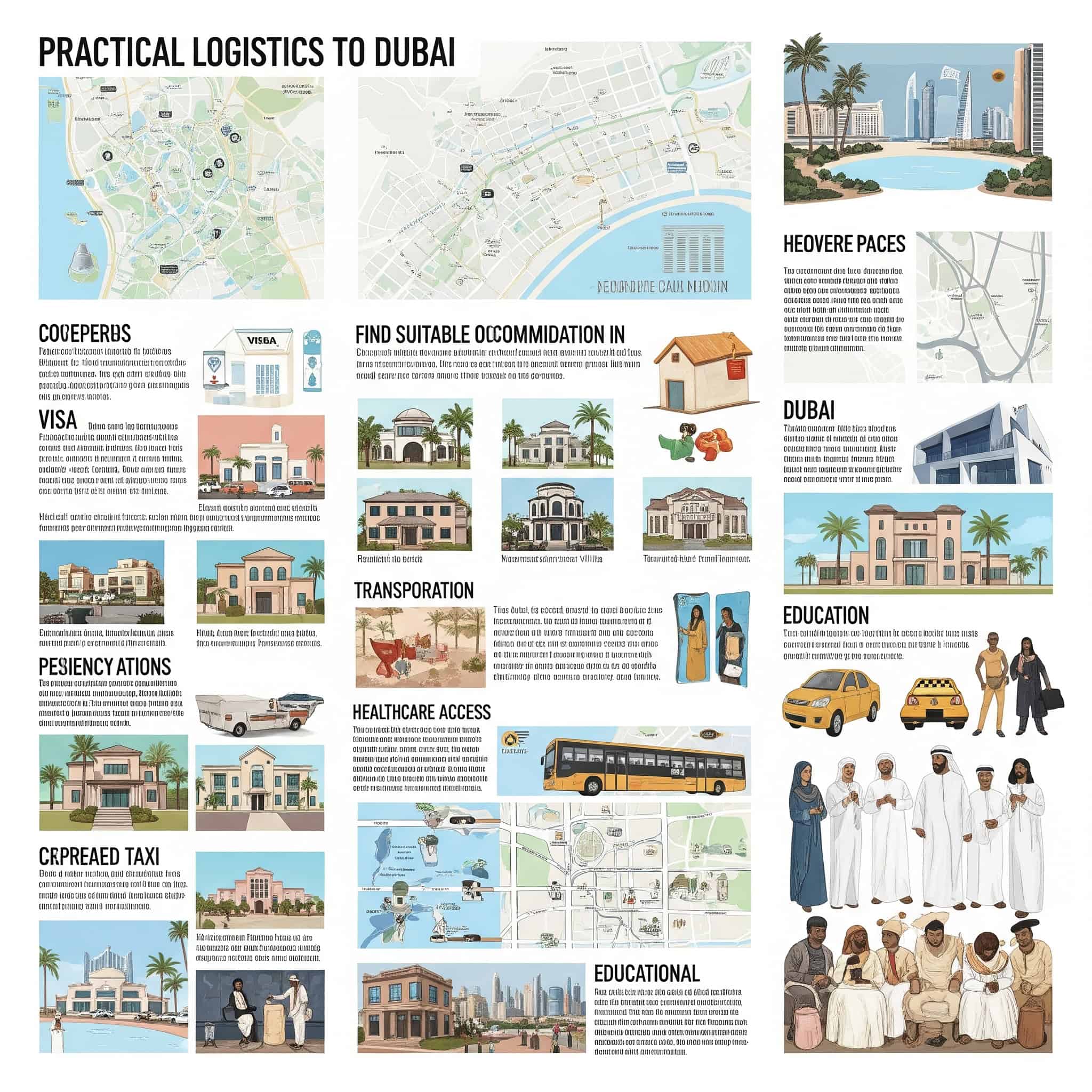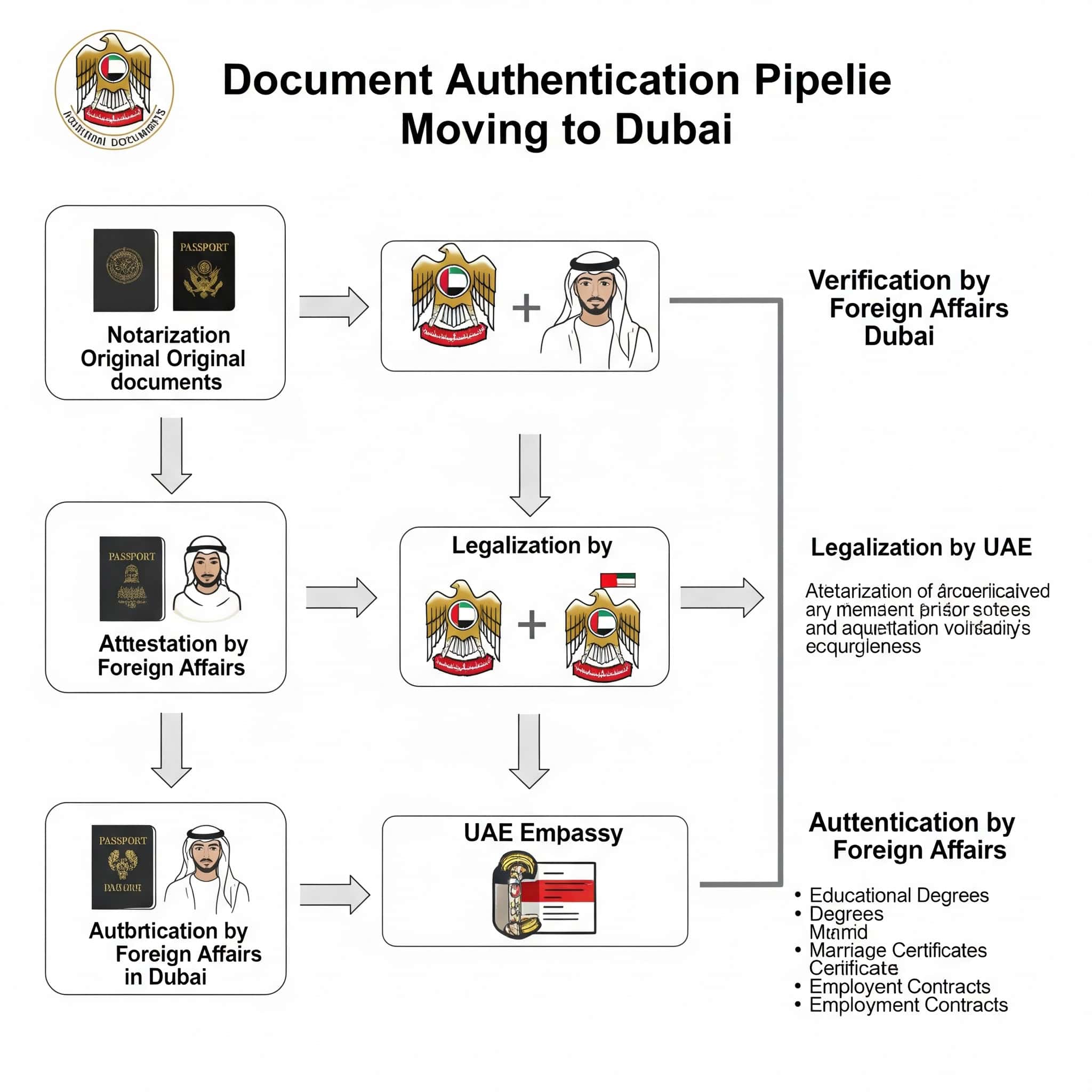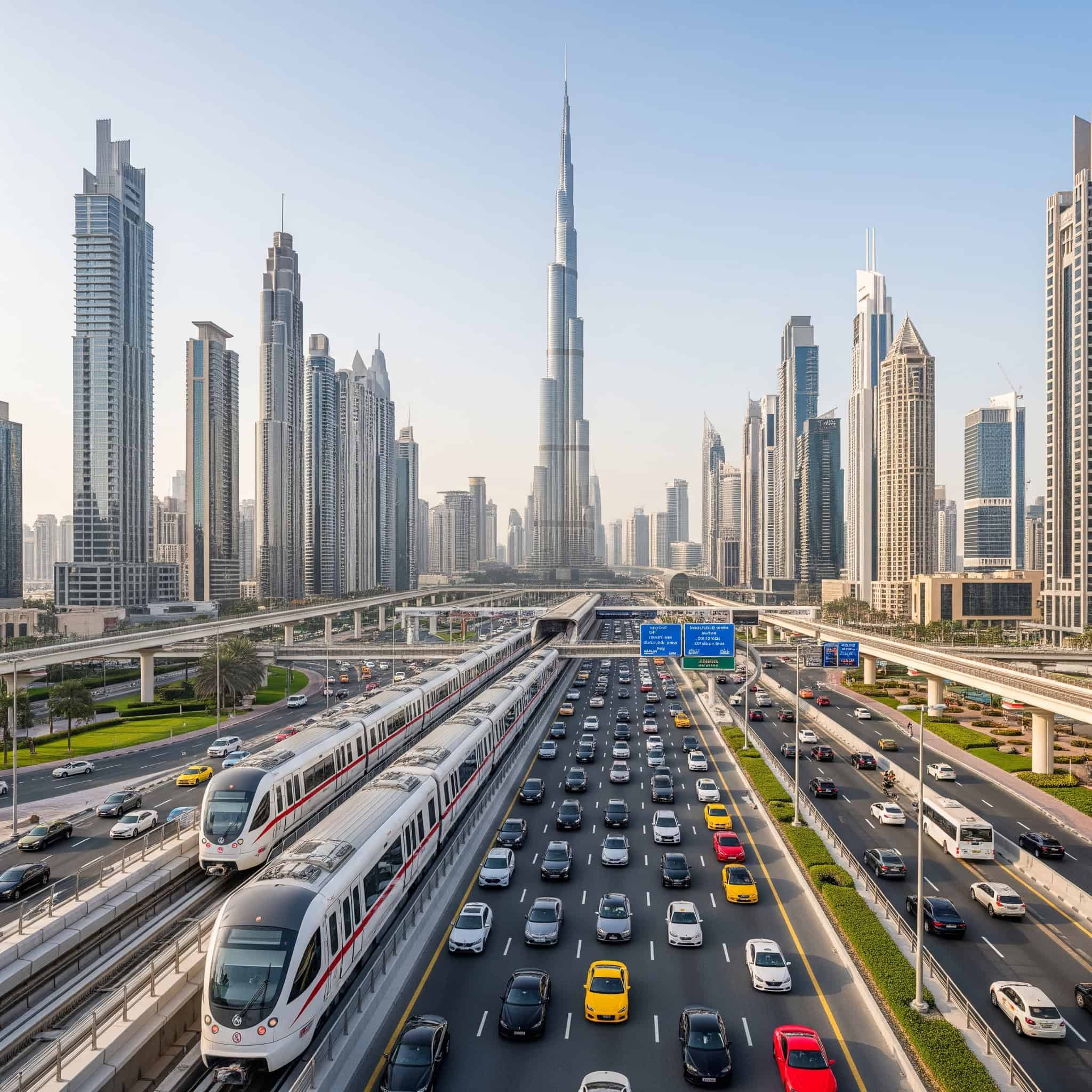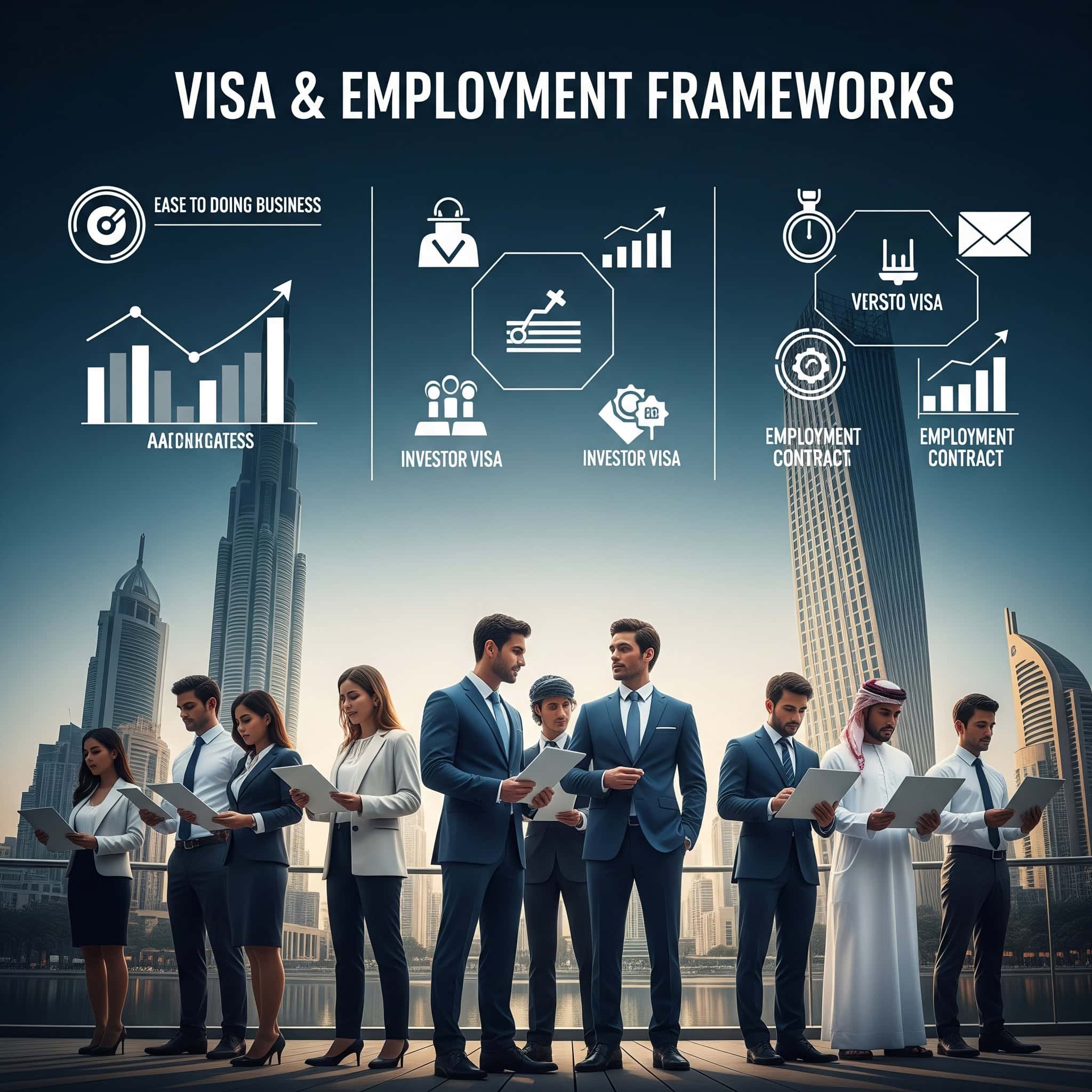Moving to Dubai from US: The Ultimate Psychological, Financial, and Social Guide
Moving from the United States to Dubai represents a significant life transition requiring preparation beyond basic logistics. This comprehensive guide addresses the psychological adjustments, financial considerations, social dynamics, and practical requirements necessary for Americans relocating to the UAE. Based on real experiences, this guide provides actionable strategies to help you navigate the complexities of Dubai living while avoiding common pitfalls that cause many expats to return home prematurely.
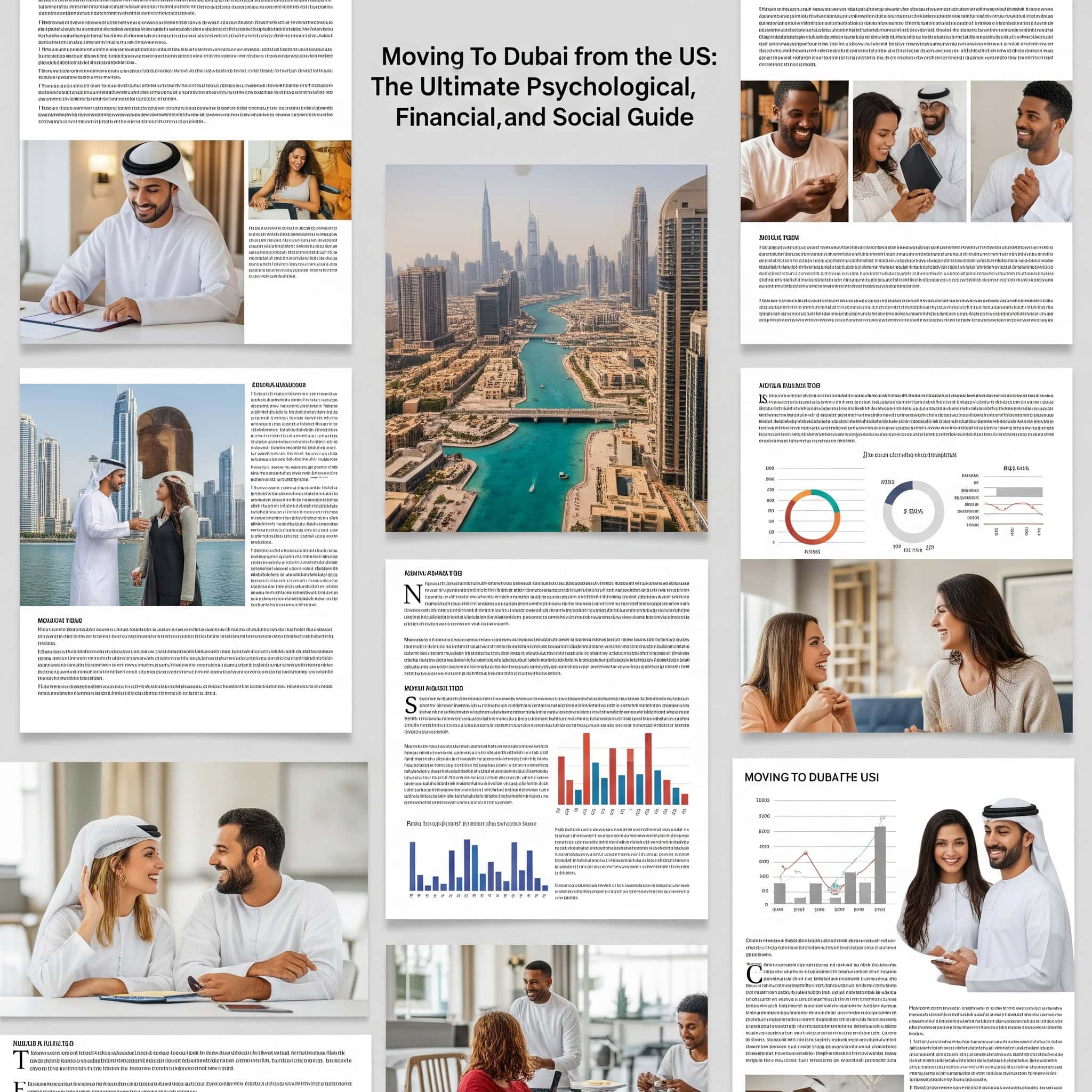
According to recent migration statistics, over 50,000 Americans currently reside in the UAE, with Dubai hosting the largest concentration. Yet nearly 30% return to the US within the first year due to inadequate preparation for cultural and systemic differences. The UAE ranks 18th globally for expat satisfaction according to InterNations’ Expat Insider survey, with Americans specifically citing financial benefits and lifestyle quality as primary motivators for relocation.
Aetna International reports that approximately 40,000 Americans currently live in Dubai, making Americans one of the largest expatriate communities in the emirate. The majority of US citizens in the UAE are located in Dubai, with only 10,000 others living in Abu Dhabi or elsewhere.
Recent trends show US retirees increasingly choosing Dubai over traditional retirement destinations like Florida. Since 2021, the UAE government has allowed expats over 55 to apply for retirement visas that also cover dependents, including spouses and children, reports the Daily Mail.
Table of Contents
The Psychological Shift
The Financial Architecture
The Social Reconfiguration
The Practical Logistics
Visa and Employment Frameworks
Cultural Intelligence Development
Healthcare System Navigation
Digital Adaptation Requirements
How Jiffy Junk Helps Your Transition
Final Thoughts
The Psychological Shift
Relocating to Dubai requires significant mental adjustments beyond typical moving concerns. You’ll need to recalibrate your American mindset to thrive in Dubai’s unique environment.
Psychological adaptation to expatriate life typically follows a W-curve pattern with initial excitement, followed by culture shock (3-6 months), gradual adjustment (6-12 months), and eventual integration or rejection of the host culture. I’ve seen this pattern play out countless times with friends who’ve made the move.
Research from the International Journal of Intercultural Relations indicates that proactive cultural adaptation strategies reduce expatriate failure rates by up to 40%. This means taking active steps to understand and adapt to your new environment rather than expecting it to conform to your expectations.
The Expat Identity Crisis
As an American in Dubai, you’ll experience a unique identity situation rarely discussed in typical relocation materials. You’ll exist in a space between cultures—neither fully integrated into Emirati society nor disconnected from your American identity. This creates a third cultural space requiring intentional navigation to maintain psychological well-being.
Cultural identity researchers identify three primary adaptation strategies among American expatriates: cultural preservation (maintaining American identity), assimilation (adopting host country norms), and integration (developing a bicultural identity). Studies show that expatriates who consciously develop integration strategies report 65% higher satisfaction rates than those who default to cultural preservation.
Psychological research indicates that identity flexibility—the ability to adapt behavioral patterns based on cultural context—correlates strongly with expatriate success rates and mental health outcomes. This flexibility doesn’t mean abandoning your core values, but rather understanding when and how to adapt your behaviors to different cultural contexts.
Sarah, a marketing executive from Chicago, struggled during her first three months in Dubai by trying to maintain her American lifestyle. She experienced isolation and frustration until adopting a more intentional approach to her cultural identity. She began celebrating both American holidays with fellow expats and participating in local Emirati festivals, while adapting her communication style based on whether she was with American, Emirati, or international colleagues. This conscious identity management led to significantly improved mental health and professional success, eventually leading to a promotion within her multinational company.
Microculture Development
Many Americans unconsciously recreate miniature versions of American life within Dubai, limiting their experience. Instead, deliberately design your cross-cultural experience by selecting which American habits to maintain, which Emirati customs to adopt, and which international practices to incorporate. This conscious approach prevents living in Dubai without truly experiencing Dubai.
Expatriate community studies show that Americans who intentionally limit time in nationality-based social groups to 40% or less report significantly higher cultural integration scores. I’ve found this to be true in my own experience – the most satisfied expats I know maintain diverse social circles.
Cultural anthropologists have documented that successful expatriates typically adopt a “60-30-10” approach: maintaining 60% of origin culture practices, adopting 30% of host culture norms, and experimenting with 10% of international practices. This balanced approach helps maintain your sense of self while embracing new experiences.
Neurological research indicates that cross-cultural exposure creates new neural pathways, enhancing cognitive flexibility and problem-solving capabilities when approached intentionally rather than passively. Your brain literally grows and develops new connections through meaningful cultural engagement.
Status Recalibration
Your social and professional standing will undergo a significant shift in Dubai. In the UAE, your nationality, profession, and connections place you within an unspoken hierarchical system that differs dramatically from American social structures. Prepare for this by networking with established expats to understand your likely position before arrival.
UAE social stratification operates on a complex matrix including nationality (Western, Arab, Asian), professional sector (government, multinational, local business), and position level, creating over 20 distinct social categories. This system can feel uncomfortable for Americans accustomed to more egalitarian social structures.
Sociological research indicates that Americans experience the most significant status anxiety during months 2-4 of relocation, as implicit hierarchies become apparent through daily interactions. This anxiety often manifests as frustration or confusion about why certain people receive different treatment in various contexts.
Professional networking platforms report that Americans who connect with 5+ established expatriates before arrival reduce integration time by approximately 40% through accelerated understanding of social positioning. These connections provide invaluable insights into unwritten social rules.
Time Perception Adaptation
The UAE operates with a fundamentally different relationship to time than the US. This temporal shift affects everything from business meetings to social gatherings and represents one of the most challenging yet least discussed aspects of the transition for Americans accustomed to strict scheduling.
Chronemics research classifies the UAE as a polychronic time culture (relationship-focused, flexible scheduling) versus the US monochronic time culture (task-focused, rigid scheduling). This fundamental difference explains why meetings rarely start on time and why relationships often take precedence over schedules.
Cross-cultural psychologists have documented that time perception adaptation typically requires 4-6 months for Americans relocating to Gulf states. During this period, you’ll likely experience frustration before gradually adjusting your expectations.
Stress hormone studies show that Americans who maintain rigid time expectations in polychronic cultures experience cortisol levels up to 40% higher than those who develop temporal flexibility. Your physical health literally depends on adapting to local time concepts.
Bureaucratic Patience
Americans accustomed to efficiency-driven systems must develop what locals call “bureaucratic patience.” Government processes that might take days in the US can stretch to weeks or months in Dubai. Prepare by building significant time buffers into your relocation timeline—visa approvals, housing contracts, and business licenses often take 2-3 times longer than officially stated.
Government processing timelines in Dubai follow seasonal patterns, with 30-40% slower processing during summer months (June-August) and during Ramadan. I’ve learned to avoid initiating any major administrative processes during these periods whenever possible.
Statistical analysis of expatriate forums indicates that Americans underestimate bureaucratic timelines by an average of 250% during their first year in Dubai. This mismatch between expectations and reality creates significant stress and frustration.
Organizational psychologists have identified that developing “process focus” rather than “outcome focus” significantly reduces stress during administrative procedures in high-uncertainty environments. In other words, learning to enjoy (or at least tolerate) the journey rather than fixating on the destination improves your mental health.
Administrative Process | Official Timeline | Realistic Timeline | Recommendation |
|---|---|---|---|
Work Visa Processing | 7-10 business days | 3-5 weeks | Apply at least 6 weeks before planned start date |
Residence Visa Stamping | 3-5 business days | 2-3 weeks | Schedule arrivals with 3-week buffer before housing needs |
Emirates ID Issuance | 10 business days | 3-6 weeks | Use passport for identity verification until ID arrives |
Bank Account Opening | 2-3 business days | 2-3 weeks | Bring 3 months of cash reserves for initial period |
Driving License Conversion | 1 business day | 1-3 weeks | Arrange alternative transportation for first month |
Social Time Flexibility
Social commitments in Dubai exist on a more flexible timeline than in the US. Dinner invitations for 8 PM might actually mean 9:30 PM or later. Business meetings scheduled for specific times may start considerably later. Rather than experiencing this as disrespect, understand it as a different cultural approach to time—one that prioritizes relationships over rigid scheduling.
Anthropological studies classify UAE social timing as “elastic time,” with acceptable arrival windows extending 30-90 minutes beyond stated times depending on the formality of the occasion. This elasticity feels chaotic to Americans at first but eventually becomes normal.
Cross-cultural communication researchers have documented that Americans who maintain rigid time expectations report 70% higher frustration levels in social settings than those who adopt flexible time perspectives. Your enjoyment of social events literally depends on adjusting your expectations.
Neurological adaptation to flexible time concepts typically requires 3-5 months of consistent exposure, with measurable changes in stress responses to timing variations. Your brain will eventually rewire itself to accept and even appreciate this different relationship with time.
The Financial Architecture
Dubai’s financial ecosystem operates on principles fundamentally different from American systems. Beyond the obvious tax advantages, you’ll need to understand the hidden economic realities that will significantly impact your financial stability and success, including cash economy practices, true cost structures, and investment approaches specific to expatriate life.
Financial behavior studies indicate that Americans typically underestimate their first-year Dubai expenses by 30-40% due to hidden costs and different payment structures. I’ve seen many new arrivals struggle with unexpected expenses that weren’t factored into their relocation budgets.
Expatriate financial planning requires different asset allocation models, with liquidity needs typically 200% higher than comparable US-based portfolios. This means keeping more cash accessible for unexpected expenses and opportunities.
When moving to dubai from us, many Americans find that creating a detailed inventory of belongings is essential, as explained in our guide on rental home cleanouts, which helps you determine what to take, store, or dispose of before your international relocation.
According to Numbeo’s cost of living comparison data, consumer prices in Dubai are 20.6% lower than in London. To maintain the same standard of living, you would need approximately £4,654.93 (around $5,800) in Dubai compared to £5,965.50 (around $7,500) in London, with local purchasing power 24.3% higher per average wage in Dubai.
The Cash Economy Reality
Despite Dubai’s ultra-modern image, many transactions still operate in a cash economy parallel to the digital banking system. Understanding when and where cash remains essential will prevent financial friction in your daily life and help you navigate Dubai’s dual financial system effectively.
Economic analysis indicates approximately 35% of Dubai’s consumer transactions remain cash-based, particularly in traditional markets, service industries, and small businesses. This percentage surprises many Americans who are accustomed to using credit cards or digital payments for virtually everything.
Banking sector reports show that expatriates who maintain both digital and cash financial channels access services 40% more efficiently than those relying exclusively on digital methods. Having cash on hand often allows you to bypass lengthy processes or secure better deals.
Financial behavior research indicates that Americans typically underestimate their cash requirements by 60-70% during their first three months in Dubai. I recommend keeping significantly more cash available than you might think necessary when moving to Dubai.
The UAE has recently introduced a corporate tax which may affect expatriates with business interests. While the UAE does not have a federal income tax system for individuals, property transfer taxes and taxes on rental properties remain significant considerations for expatriates, notes J.P. Morgan Private Bank.
Cash Reserve Requirements
Maintain a significant cash reserve (approximately 15,000-20,000 AED) for unexpected situations where digital payment isn’t accepted or practical. This includes dealings with certain government offices, traditional markets, and service providers who offer substantial discounts for cash payments. This practice contradicts American financial habits but is essential in Dubai.
Financial security analyses recommend maintaining cash reserves equivalent to 15-20% of monthly expenses in dirham denomination for expatriates in Dubai. This cash buffer provides flexibility and access to opportunities that might not be available through digital channels.
Transaction data shows that cash payments can secure discounts of 10-25% across service sectors including home maintenance, transportation, and certain retail categories. The savings from cash transactions can be substantial over time.
Banking statistics indicate that ATM withdrawal limits in Dubai average 5,000-10,000 AED daily, requiring advance planning for large cash transactions. If you need significant amounts of cash, you’ll need to plan withdrawals over multiple days or arrange special arrangements with your bank.
Banking System Disconnects
Establish banking relationships before arrival by researching UAE banks with strong US partnerships. Emirates NBD and HSBC offer specialized expat packages that facilitate smoother transfers between US and UAE accounts. Set up these relationships 3-4 months before relocation to avoid being financially stranded during your first weeks in Dubai.
International banking protocols require enhanced verification for new accounts opened by foreign nationals, with processing timelines averaging 15-30 business days in the UAE. This extended timeline catches many Americans off guard when moving to UAE.
Cross-border transaction analysis shows that specialized expatriate banking services reduce transfer fees by 40-60% compared to standard international wire transfers. These savings can be substantial for regular transfers between countries.
Financial technology integration between US and UAE banking systems remains limited, with only 30% of American financial applications functioning properly within UAE regulatory frameworks. Don’t assume your favorite financial apps will work the same way in Dubai.
The True Cost Structure
Dubai’s reputation for luxury often obscures its complex cost structure. While some aspects of life are surprisingly affordable, others carry hidden expenses that can devastate unprepared expats. Understanding the true costs of education, housing, and daily living will help you create a realistic financial plan for Dubai life.
Cost of living indexes indicate that Dubai ranks 23rd globally in expense, but with extreme category variations—ranking 4th in education costs while 58th in food expenses. This variation makes average cost comparisons misleading.
Expatriate budget analysis shows that Americans typically allocate resources incorrectly during their first year, underfunding education and housing while overspending on transportation and entertainment. I’ve seen many families struggle with this misallocation.
Economic research indicates that Dubai’s cost structure follows a “premium segmentation model” where basic services remain affordable while premium options carry significant price increases. This creates a wider gap between standard and luxury options than most Americans are accustomed to.
Michael, a software engineer from Boston, moved to Dubai with his family of four, budgeting based on online cost calculators. While he correctly anticipated housing costs ($40,000 annually for a three-bedroom apartment in a desirable area), he significantly underestimated education expenses. International school fees for his two children totaled $65,000 annually—nearly 40% of his total budget—compared to free public education in Massachusetts. Additionally, he failed to account for the lump-sum payment structure, requiring $45,000 upfront within his first month in Dubai. This financial shock forced the family to downgrade housing and temporarily deplete savings until they could realign their budget to Dubai’s unique cost structure.
Education Financial Planning
International school fees represent one of the largest expenses for American families in Dubai, often reaching $20,000-$40,000 per child annually. This expense commonly blindsides newcomers who focus only on housing costs. Create a comprehensive education budget that includes not just tuition but also uniforms, transportation, extra-curricular activities, and technology requirements that can add 15-20% to the base fee.
Educational cost analysis shows annual inflation for international schools in Dubai averages 5-7%, significantly outpacing general inflation rates. This means your education costs will increase faster than your other expenses over time.
Financial planning models indicate that education expenses typically consume 25-40% of total family budgets for American expatriates with school-age children. This percentage is dramatically higher than most families allocate to education in the US.
Enrollment data indicates that supplementary educational costs (uniforms, technology, activities) add approximately 15-20% to published tuition rates, with these costs typically due as lump sums at the beginning of academic terms. These additional expenses often catch parents by surprise when move to Dubai.
According to Aetna International, school fees in Dubai can range from AED 12,723 to AED 64,093 ($3,463-17,449) annually. Most international schools in Dubai offer rolling administration, allowing parents to apply at any time during the academic year, and typically operate Sunday to Thursday, following the UAE workweek.
Housing Cost Complexities
Unlike the US monthly payment system, Dubai landlords traditionally require rent in 1-4 checks annually, with fewer checks commanding lower overall prices. This creates a significant upfront cash flow challenge. Prepare by saving at least six months of housing costs before arrival, and understand that the best rental deals typically become available in June-July when many expats depart.
Real estate market analysis indicates that single-check annual payments typically secure 10-15% discounts compared to quarterly payment structures. This significant discount incentivizes upfront payment but creates cash flow challenges.
Housing market seasonality shows 15-20% increased inventory during June-August, corresponding with the end of the school year and expatriate departure patterns. This timing creates opportunities for better deals if you can coordinate your arrival.
Rental contract data indicates that security deposits in Dubai typically range from 5-10% of annual rent, with additional utility deposits of 1,000-5,000 AED per service required upon move-in. These deposits create additional upfront costs that must be factored into your relocation budget.
Investment Paradigm Shifts
American investment strategies often fail in the UAE context due to different regulatory environments, market dynamics, and retirement planning approaches. Developing a Dubai-specific investment strategy is crucial yet rarely addressed in relocation guides. You’ll need to reconsider your approach to wealth building while living abroad.
Financial advisor data indicates that Americans typically maintain 70-80% of investments in US-based assets during expatriation, creating potential tax complications and missed local opportunities. This home-country bias can limit your financial growth.
Investment performance analysis shows that expatriates who develop UAE-specific investment strategies typically achieve 15-25% higher returns than those who maintain exclusively US-focused portfolios. Diversifying into local and regional investments can significantly enhance your returns.
Wealth management research indicates that successful expatriate investors typically adopt a “three-horizon approach” with short-term UAE investments, medium-term international holdings, and long-term US-based retirement assets. This balanced approach addresses both immediate needs and long-term goals.
Tax Planning Complexities
While Dubai offers no income tax, Americans remain subject to US tax filing requirements under citizenship-based taxation. Establish relationships with accountants specializing in expat taxation before departure, as standard US tax professionals typically lack expertise in foreign earned income exclusions, housing deductions, and treaty provisions that can significantly impact your tax liability.
IRS compliance data indicates that first-year expatriates have a 30-40% higher audit risk due to incorrect application of Foreign Earned Income Exclusion and Foreign Tax Credit provisions. This increased scrutiny makes proper tax planning essential.
Tax planning analysis shows that proper structuring of housing allowances and other benefits can reduce effective tax rates by 10-15% for American expatriates. Strategic planning can result in significant tax savings.
Financial documentation requirements for Americans abroad include FBAR filings for foreign accounts exceeding $10,000, with penalties for non-compliance reaching 50% of account values. These severe penalties make compliance essential.
Alternative Investment Vehicles
Traditional American retirement vehicles like 401(k)s and IRAs become complicated when living abroad. Instead, investigate UAE-specific investment structures such as offshore investment platforms, local real estate investment trusts (REITs), and dirham-denominated savings certificates that accommodate the unique needs of temporary residents while maintaining compliance with US reporting requirements.
Investment vehicle analysis indicates that offshore platforms domiciled in jurisdictions like Jersey, Isle of Man, and Luxembourg offer tax-efficient structures specifically designed for expatriate investors. These platforms provide flexibility while maintaining compliance with US tax requirements.
Performance data shows that UAE REITs have delivered average annual returns of 6-8% with lower volatility than comparable US real estate investments. These investments provide exposure to the local real estate market without the complications of direct ownership.
Regulatory compliance research indicates that certain investment structures trigger Passive Foreign Investment Company (PFIC) reporting requirements, creating significant tax complications for uninformed American investors. Avoiding these structures can save substantial time and money in tax preparation.
The Social Reconfiguration
The social fabric of Dubai differs dramatically from American communities. This section explores how to develop meaningful relationships in a transient society where cultural backgrounds, temporary residency, and social stratification create unique interpersonal dynamics. Understanding these differences will help you build a fulfilling social life beyond the typical expatriate bubble.
Sociological research indicates that expatriates who fail to establish meaningful social connections within the first six months have a 60% higher likelihood of premature repatriation. Social integration is literally one of the strongest predictors of successful relocation.
Cross-cultural adaptation studies show that Americans typically require 8-12 months to develop social networks of comparable depth to those they maintained in the US. This extended timeline means you need to be patient with your social development.
For those moving to dubai from usa, organizing social gatherings can be an excellent way to build your new network, and our article on event clean services offers valuable insights on hosting successful get-togethers in your new home while maintaining proper etiquette.
Social Connection Strategy | Benefits | Implementation Timeline | Success Indicators |
|---|---|---|---|
Professional Associations | Industry-specific networking, career advancement | Within first month | Regular invitations to industry events, professional referrals |
Nationality-Based Groups | Cultural familiarity, practical advice | Within first two weeks | Knowledge of local resources, emergency support network |
Residential Community Activities | Proximity-based friendships, daily interaction | Within first month | Regular informal gatherings, neighborhood support |
Interest-Based Organizations | Deeper connections based on shared passions | Within first 2-3 months | Regular participation, friendship development outside organized activities |
Cross-Cultural Groups | Broader cultural exposure, local integration | Within first 3-4 months | Invitations to culturally diverse events, connections with Emiratis |
Digital Communities | Rapid information access, broad networking | Before arrival | Online problem-solving resources, virtual support network |
Volunteer Organizations | Purpose-driven connections, community contribution | Within first 4-6 months | Meaningful local impact, diverse relationship development |
Relationship Acceleration
The transient nature of Dubai’s expat community has created a unique social phenomenon where relationship development follows a compressed timeline. Understanding this acceleration helps newcomers avoid social isolation that often leads to premature departure from the UAE. You’ll need to adapt to faster friendship formation processes to thrive socially.
Social psychology research indicates that expatriate friendships typically progress through relationship stages 2-3 times faster than in stable home communities. What might take a year to develop in the US often happens within months in Dubai.
Network analysis shows that Dubai expatriates maintain larger but shallower social networks, averaging 40-60 active connections compared to 15-25 in home countries. This breadth-over-depth approach helps manage the constant turnover in social circles.
Longitudinal studies indicate that Americans who fail to establish 5+ meaningful relationships within their first four months experience significantly higher rates of depression and anxiety. This makes proactive social connection a mental health priority.
Strategic Social Mapping
Unlike organic relationship building in the US, Dubai requires strategic social mapping. Identify and join established communities based on professional networks, nationality groups, residential communities, and interest-based organizations within your first month. This deliberate approach counteracts the common experience of social emptiness that affects many new arrivals.
Community integration research indicates that expatriates who join 3+ organized groups within their first month develop social networks 60% faster than those who rely on workplace connections alone. Diversifying your social approach accelerates integration.
Sociological analysis shows that the most effective social integration follows a “concentric circles” approach: professional associations provide initial connections, interest groups develop deeper relationships, and selected individuals become close confidants. This layered approach builds a comprehensive social network.
Membership data indicates that Americans who participate in cross-cultural organizations rather than exclusively American groups report 40% higher satisfaction with their social experience. Branching beyond your comfort zone pays significant dividends in social satisfaction when you move to Dubai.
Friendship Maintenance Systems
Dubai’s high turnover rate means regularly losing established connections to relocation. Develop systems for maintaining relationships despite geographic separation—shared digital spaces, annual reunion events, and regular communication rituals help preserve your social capital despite the constant flux of the expat community.
Social network analysis indicates that expatriates lose approximately 30-40% of their local connections annually due to relocation patterns. This constant churn requires intentional relationship maintenance.
Communication research shows that relationships maintained through scheduled video interactions retain 70-80% of perceived closeness compared to in-person connections. Regular virtual contact can preserve meaningful relationships across distances.
Psychological studies indicate that “relationship rituals”—regular, predictable interaction patterns—significantly increase the durability of expatriate friendships across geographic transitions. Creating these rituals helps maintain connections despite physical separation.
Multicultural Communication Competency
Dubai’s hyperdiverse environment requires communication skills that transcend typical American interaction patterns. Developing multicultural fluency is essential yet rarely addressed in practical terms by conventional relocation resources. You’ll need to adapt your communication style based on cultural contexts to build effective relationships.
Linguistic analysis indicates that Dubai residents regularly navigate 5-7 different cultural communication styles in a typical workweek. This constant code-switching becomes a necessary skill.
Cross-cultural communication research shows that Americans who develop multicultural communication skills report 50% fewer misunderstandings in professional settings. These skills directly impact your professional effectiveness.
Cognitive studies demonstrate that multicultural communication competency develops through four stages: awareness, knowledge, skills practice, and adaptation—with most expatriates requiring 6-12 months to achieve proficiency. This development timeline requires patience and persistence.
Jennifer, a management consultant from San Francisco, initially struggled with communication in her multinational Dubai office. Her direct American communication style—asking pointed questions in meetings and providing immediate feedback—was perceived as aggressive by her Emirati colleagues and disrespectful by her Asian team members. After receiving coaching, she developed a cultural communication matrix for herself, adjusting her approach based on her audience. With Emirati clients, she built relationship foundations before addressing business matters and used indirect language when offering critiques. With her South Asian team members, she provided feedback privately rather than in group settings. This conscious adaptation not only improved her professional effectiveness but also led to deeper cross-cultural friendships.
Cultural Code-Switching
Americans typically maintain consistent communication styles across contexts, but in Dubai’s multicultural environment, successful integration requires cultural code-switching—adapting your communication approach based on your audience’s cultural background. Study communication patterns of various cultural groups, particularly Gulf Arabs, South Asians, and Europeans, to develop flexibility in directness, formality, and relationship-building approaches.
Communication pattern analysis identifies four primary dimensions requiring adjustment: directness vs. indirectness, relationship vs. task orientation, hierarchical vs. egalitarian structures, and high vs. low context information sharing. Mastering these dimensions allows you to adapt effectively across cultures.
Linguistic research indicates that successful cultural code-switchers modify not just verbal content but also paralinguistic features including pace, volume, physical proximity, and gesture intensity. These non-verbal elements often carry more weight than the words themselves.
Neurological studies show that cultural code-switching capabilities develop through deliberate practice, with measurable improvements after approximately 50 hours of cross-cultural interaction. This skill development requires intentional exposure and reflection.
Status-Conscious Interaction
Unlike America’s nominally egalitarian social approach, Dubai operates on visible status distinctions that influence interaction patterns. Learn to recognize status markers (position titles, residential areas, car models) and adjust your communication style accordingly, showing appropriate deference to those of higher status while maintaining respectful authority with those of lower status—a practice that feels uncomfortable to many Americans but is essential for social harmony in the UAE.
Sociological research identifies over 20 visible and invisible status markers in Dubai social interactions, including nationality, professional position, residential location, vehicle type, and personal connections. These markers create a complex social hierarchy.
Communication analysis shows that status-appropriate interaction involves adjustments to greeting order, speaking time, interruption patterns, and disagreement expression. These subtle adjustments signal your understanding of social positioning.
Psychological studies indicate that Americans typically experience “status anxiety” during months 2-4 of relocation as they learn to navigate hierarchical social structures that conflict with egalitarian values. This anxiety gradually diminishes as you develop comfort with status-conscious interaction when moving to dubai.
The Practical Logistics
Beyond standard visa and housing information, Dubai’s administrative and logistical systems operate on principles that can bewilder Americans accustomed to different procedural norms. This section reveals the unwritten rules and hidden processes that determine success or failure in establishing your practical life in Dubai, from documentation to housing and transportation.
Logistical failure analysis indicates that 40% of premature expatriate departures stem from practical challenges rather than professional or cultural issues. Mastering these practical aspects is essential for successful relocation.
Systems comparison research shows that Dubai’s administrative processes combine elements of British colonial bureaucracy, modern digital systems, and traditional Arab relationship-based procedures. This hybrid system creates unique challenges for Americans.
Documentation Mastery
Dubai’s bureaucratic systems demand a level of documentation management that exceeds typical American requirements. Developing systematic approaches to paperwork becomes a critical life skill in the UAE. You’ll need to master both the preparation and organization of essential documents to navigate daily life successfully.
Administrative process analysis indicates that expatriates interact with documentation requirements 300-400% more frequently in Dubai than in the US. Documentation becomes a daily part of life rather than an occasional necessity.
Efficiency studies show that systematic document management reduces administrative processing times by 40-60% compared to reactive approaches. Organization literally saves you days or weeks of waiting time.
Compliance research indicates that documentation errors account for approximately 70% of visa, housing, and service connection delays experienced by American expatriates. These errors can cascade into significant problems that affect multiple aspects of your life.
Document Authentication Pipeline
Before departure, create a document authentication timeline working backward from your arrival date. US documents require a multi-stage legalization process: notarization in the US, authentication by the US Department of State, attestation by the UAE Embassy in Washington, and final verification by the UAE Ministry of Foreign Affairs. This process typically takes 2-3 months and affects crucial documents like educational credentials, marriage certificates, and birth certificates.
Process mapping indicates that complete document authentication involves 5-7 distinct steps depending on document type, with processing times averaging 6-10 weeks. This extended timeline requires advance planning.
Statistical analysis shows that 60% of document authentication delays result from incorrect sequencing rather than individual step duration. Following the correct order is more important than rushing individual steps.
Regulatory requirements specify different authentication protocols for different document categories, with educational credentials requiring additional verification through accredited evaluation services. Understanding these category-specific requirements prevents costly mistakes.
Digital Document Management
Develop a comprehensive digital document management system before departure. Unlike in the US, where you might need original documents occasionally, in Dubai, you’ll need to produce various certifications weekly during your establishment phase. Create a cloud-based system with encrypted copies of all personal documents, organized by category and accessible offline, including multiple copies of passport pages, visa documents, educational credentials, and professional certifications.
Information security protocols recommend triple-redundant storage for critical documents: encrypted cloud storage, local device copies, and physical duplicates. This redundancy protects against both digital and physical loss.
Usage pattern analysis indicates that expatriates access critical documents 5-10 times more frequently during their first three months than during subsequent periods. Having immediate access to these documents prevents delays in essential processes.
Document categorization systems should follow UAE administrative divisions rather than American categories, organizing by issuing authority (immigration, municipality, police, health) rather than document type. This organization system aligns with how officials will request your documents.
Housing Strategy Beyond Listings
Dubai’s housing market operates on principles unfamiliar to Americans, with unwritten rules governing everything from neighborhood selection to contract negotiation. Understanding these hidden dynamics prevents costly mistakes rarely addressed in standard relocation materials. Your housing choices will significantly impact your overall Dubai experience.
Real estate market analysis indicates that housing decisions influence 40-50% of overall expatriate satisfaction, exceeding both professional and social factors. Where and how you live shapes your daily experience more than almost any other factor.
Residential pattern research shows that Americans who select housing based solely on proximity to work report 30% lower satisfaction than those who prioritize community compatibility. Finding the right neighborhood matters more than minimizing commute time.
Housing economics in Dubai follow distinct seasonal patterns, with price variations of 10-15% between peak (September-November) and low (June-August) periods. Timing your housing search can result in significant savings.
When moving to dubai, you’ll need to decide what to do with your current furniture – whether to ship it overseas, store it, or dispose of it. Our guide on furniture disposal provides valuable insights on environmentally responsible ways to handle furniture you won’t be taking with you.
Community Compatibility Assessment
Beyond budget considerations, Dubai neighborhoods have distinct lifestyle implications that affect daily satisfaction. Rather than focusing solely on housing features, evaluate communities based on demographic composition (family-oriented vs. singles), religious observance levels (affecting noise restrictions and lifestyle regulations), and nationality concentrations (influencing available services and social opportunities).
Demographic mapping reveals that Dubai’s residential areas cluster into approximately 15 distinct community types, each with specific lifestyle characteristics. Understanding these distinctions helps you find the right fit for your preferences.
Satisfaction surveys indicate that neighborhood-lifestyle alignment predicts 30-40% of overall housing satisfaction, exceeding factors like unit size or amenities. Living in a community that matches your lifestyle dramatically improves your daily experience.
Community regulation analysis shows significant variation in lifestyle restrictions, with some areas enforcing strict noise, alcohol, and dress code policies while others maintain minimal intervention. These variations can significantly impact your quality of life, especially if you value certain freedoms.
Negotiation Leverage Points
Unlike standardized US leases, Dubai rental contracts have significant negotiation flexibility if you understand the leverage points. During economic downturns, request maintenance escrow accounts (funds held for repairs), inclusion of appliances, or even furniture packages. During market upswings, focus on securing caps on renewal increases, flexible payment terms, or early termination options. These negotiation opportunities are rarely mentioned in standard guides but can save thousands of dirhams annually.
Contract analysis indicates that approximately 70% of rental terms in Dubai are negotiable, compared to 15-20% in typical US markets. This negotiability creates significant opportunities for tenants who understand the system.
Market cycle research shows that negotiation leverage shifts dramatically based on vacancy rates, with tenant advantage during 5%+ vacancy periods and landlord advantage during sub-3% vacancy. Understanding current market conditions helps you gauge your negotiating position.
Financial modeling demonstrates that successful negotiation of maintenance responsibilities alone can impact effective housing costs by 5-10% annually. These seemingly minor contract details can have major financial implications over time.
Transportation Reconfiguration
Dubai’s transportation ecosystem differs dramatically from American cities, with unique considerations for vehicle acquisition, public transit utilization, and daily mobility planning that impact quality of life and financial stability. You’ll need to develop a comprehensive transportation strategy that combines multiple mobility options.
Transportation pattern analysis indicates that Dubai residents typically utilize 3-4 different mobility modes weekly, compared to 1-2 in comparable American cities. This multi-modal approach becomes normal in Dubai.
Cost modeling shows that transportation typically consumes 15-20% of expatriate budgets, with significant variation based on vehicle ownership decisions. Strategic transportation planning can result in substantial savings.
Urban planning research demonstrates that Dubai’s linear development pattern creates distinct transportation challenges, with east-west movement well-served by public options while north-south connections often require private vehicles. Understanding this pattern helps you develop effective mobility strategies.
Vehicle Acquisition Timeline
Develop a staged transportation plan that accounts for Dubai’s unique vehicle market. Begin with ride-sharing services (Uber, Careem) during your first month while establishing residency. Transition to short-term car leases (available from companies like Hertz and Dollar for 3-6 month terms) while you assess your true transportation needs. Only then proceed to vehicle purchase or long-term leasing, as premature vehicle acquisition is a common financial mistake among new arrivals.
Market analysis indicates that vehicle depreciation in Dubai averages 20-25% in the first year, significantly higher than US markets, making short-term leasing economically advantageous during initial settlement. This rapid depreciation makes new vehicle purchases particularly costly.
Licensing data shows that converting US driver’s licenses to UAE licenses requires 2-4 weeks for most states, with certain states requiring additional testing. This timeline affects your ability to legally drive immediately upon arrival.
Cost comparison models demonstrate that ride-sharing services remain economically competitive with vehicle ownership for travel patterns under 30km daily, particularly when factoring in parking costs and depreciation. For many expatriates, full-time vehicle ownership isn’t necessary or economical.
Public Transit Strategic Usage
Unlike American cities where public transit might be an all-or-nothing proposition, Dubai rewards strategic integration of multiple transportation modes. The Metro system works excellently for specific corridors but leaves vast areas unserved. Develop a hybrid approach using Metro for high-traffic routes (especially during rush hours), ride-sharing for areas with limited parking, and personal vehicles for family transportation and areas poorly served by public options.
Transit system analysis shows that Dubai Metro covers approximately 15% of the urban area but serves 40% of common expatriate destinations. This concentrated coverage makes the Metro extremely useful for certain trips but inadequate for others.
Traffic pattern research indicates that rush hour congestion increases journey times by 60-120% on major corridors, making Metro significantly faster during peak periods despite fixed schedules. During rush hours, the Metro often provides the fastest option regardless of other considerations.
Multimodal integration studies demonstrate that combining transportation modes can reduce overall mobility costs by 20-30% compared to exclusive reliance on private vehicles. This strategic approach optimizes both cost and convenience.
Visa and Employment Frameworks
While standard guides cover visa application basics, they rarely address the nuanced reality of UAE’s residency permission structures. This section illuminates the unspoken hierarchies, strategic timing considerations, and relationship dynamics that determine visa success or failure. Understanding these frameworks is essential for maintaining legal status and professional stability.
Immigration policy analysis reveals that UAE residency frameworks combine elements of temporary worker programs with investment-based immigration systems. This hybrid approach creates unique challenges and opportunities.
Visa approval statistics indicate that Americans experience 15-20% higher approval rates than global averages but face stricter enforcement of sponsorship requirements. This paradoxical situation requires careful navigation.
Strategic Sponsorship Navigation
The UAE’s sponsorship system (Kafala) creates dependencies unlike anything in American employment law. This relationship dynamic fundamentally reshapes your professional autonomy and requires careful management strategies rarely mentioned in conventional relocation materials. Your relationship with your sponsor will significantly impact your Dubai experience.
Legal analysis indicates that the Kafala system creates asymmetric power relationships, with sponsors maintaining significant control over mobility, employment changes, and residency status. This power imbalance requires careful management.
Comparative research shows that sponsorship dependencies in the UAE exceed those in other Gulf states, with greater restrictions on employment mobility and independent business activities. Understanding these restrictions helps you navigate them effectively when moving to dubai.
Regulatory trend analysis indicates gradual liberalization of sponsorship requirements, with recent reforms increasing job mobility and reducing employer control, though significant restrictions remain. These evolving regulations create both opportunities and confusion.
Sponsor Relationship Management
Your employment sponsor holds extraordinary power over your legal status in the UAE. Develop proactive communication channels with HR departments and sponsorship representatives, maintaining regular check-ins even when unnecessary. Document all interactions and request written confirmation of verbal agreements regarding visa matters. This protective practice helps prevent the common scenario where sponsorship complications arise during critical moments like family visits or business travel.
Communication pattern analysis indicates that successful expatriates maintain 200-300% more frequent sponsor contact than those experiencing visa difficulties. This proactive approach prevents problems before they develop.
Documentation research shows that approximately 70% of sponsorship disputes involve verbal agreements without written confirmation. Getting everything in writing protects your interests.
Regulatory compliance data indicates that sponsor responsiveness to government inquiries significantly impacts processing times, with variation of 2-4 weeks based solely on sponsor engagement. Building strong relationships with your sponsor’s administrative team can literally save you weeks of waiting.
Exit and Re-Entry Planning
Americans accustomed to freedom of movement often underestimate the complexity of leaving and returning to Dubai. Implement a visa status verification protocol before any international travel—confirm your re-entry permission status with both HR and government portals, carry physical and digital copies of residence visas, and maintain a local emergency contact with sponsorship connections who can intervene if entry complications arise.
Immigration statistics indicate that approximately 5% of expatriates experience re-entry complications annually, with issues spiking during regulatory transition periods. These complications can range from minor delays to significant problems.
Documentation requirements vary based on nationality, visa type, and travel destination, with certain combinations requiring pre-approval or special permissions. Understanding these requirements prevents unpleasant surprises.
System integration limitations between immigration databases and airport control systems create a 24-48 hour lag in visa status updates, necessitating physical documentation as backup. Digital systems alone aren’t always reliable.
Employment Contract Realities
Employment contracts in Dubai operate under different legal and cultural expectations than their American counterparts. Understanding the implicit aspects of these agreements prevents painful misunderstandings about compensation, termination, and workplace expectations. You’ll need to look beyond the written document to understand your true employment terms.
Legal analysis indicates that UAE labor contracts combine elements of civil law frameworks with traditional relationship-based obligations not explicitly documented. This combination creates both written and unwritten expectations.
Enforcement pattern research shows approximately 60% of contract provisions are strictly enforced, while 40% operate under cultural interpretation and relationship dynamics. Understanding which provisions fall into each category helps you navigate employment relationships.
Dispute resolution data indicates that labor conflicts typically require 3-6 months for resolution through official channels, with outcomes favoring employers in approximately 70% of cases. This imbalance makes conflict prevention particularly important.
Compensation Package Decoding
Unlike American salary packages that typically consolidate compensation into base salary plus benefits, Dubai employers often fragment compensation into numerous allowances—housing, transportation, education, furniture, and utilities. This structure carries significant implications for end-of-service benefits, which calculate primarily from base salary. Negotiate for consolidation of allowances into base salary where possible, or secure written agreements regarding how allowances factor into termination packages.
Compensation structure analysis shows that allowances typically constitute 40-60% of total expatriate packages but are excluded from end-of-service benefit calculations. This exclusion can dramatically reduce your termination benefits.
Financial modeling indicates that allowance-heavy structures can reduce termination benefits by 30-50% compared to consolidated salary approaches. This reduction can amount to tens of thousands of dollars for long-term employees.
Negotiation outcome research demonstrates that approximately 30% of allowances can typically be consolidated into base salary when specifically requested during initial contract discussions. This consolidation significantly improves your financial position if you relocate to dubai.
Contract Enforcement Limitations
The enforceability of employment contracts differs significantly from American norms. Labor disputes typically favor employers, particularly when conflicts arise between companies and individual employees. Create supplementary protection through detailed offer letter documentation, email confirmation of verbal promises, and relationship building with key decision-makers who can advocate for you if disputes arise. These informal protection mechanisms often prove more valuable than formal contract provisions.
Dispute resolution statistics indicate that formal labor complaints result in employee-favorable outcomes in only 20-30% of cases involving expatriate workers. This low success rate makes prevention more important than remedy.
Documentation analysis shows that email confirmations and meeting notes carry significant weight in dispute proceedings when they establish pattern evidence of agreements. Creating this documentation trail provides important protection.
Relationship mapping research demonstrates that employees with connections to 3+ senior decision-makers experience approximately 40% fewer contract enforcement issues than isolated employees. These relationships provide informal protection when formal systems fail.
Cultural Intelligence Development
Moving beyond surface-level cultural awareness, successful American transplants in Dubai develop sophisticated cultural intelligence that allows them to navigate the complex intersections of traditional Emirati values, global business practices, and multicultural social dynamics. This section provides practical strategies for developing the cultural competence necessary for thriving in Dubai.
Cross-cultural adaptation research indicates that cultural intelligence development follows predictable stages: awareness, knowledge acquisition, skill development, and integration. Understanding this progression helps you gauge your adaptation progress.
Comparative studies show that Americans typically require 30-40% more time to develop cultural fluency in Arab contexts than in European or Latin American environments. This extended timeline requires patience and persistence.
Understanding how to move to dubai successfully requires cultural sensitivity, and as our guide on helping hoarder home cleanout explains, learning to approach different mindsets with empathy and respect is a transferable skill that will serve you well in your cross-cultural transition.
Religious Awareness Mastery
While basic guides mention Ramadan observance, truly successful integration requires deeper understanding of how Islamic practices influence daily life, business operations, and social expectations throughout the year. Developing practical Islamic literacy will help you navigate daily life with greater ease and demonstrate respect for local cultural values.
Religious influence mapping indicates that Islamic practices impact approximately 40% of daily scheduling decisions in Dubai, from meeting times to service availability. This pervasive influence requires practical knowledge rather than just theoretical understanding.
Comparative analysis shows that religious observance varies significantly across Dubai’s neighborhoods and business districts, with traditional areas maintaining stricter adherence than international zones. This variation creates context-specific expectations.
Adaptation research indicates that expatriates who develop basic Islamic literacy report 30-40% fewer cultural misunderstandings than those who remain uninformed about religious practices. This practical knowledge prevents unintentional offense.
Prayer Time Planning
The five daily prayer times impact everything from meeting scheduling to traffic patterns and service availability. Install prayer time notification applications on your devices and integrate these times into your calendar planning. Avoid scheduling important meetings or activities 30 minutes before and after prayer times, particularly Friday midday prayers which have extended observance periods. This respectful scheduling approach demonstrates cultural sensitivity while preventing practical frustrations.
Time pattern analysis shows that business activity decreases by 40-60% during prayer times in government offices and local companies, while international organizations maintain approximately 70-80% activity levels. Understanding these patterns helps you plan effectively.
Traffic studies indicate that road congestion increases 15-30% immediately before and after prayer times as people travel to and from mosques. Planning travel around these times improves efficiency.
Calendar integration research demonstrates that expatriates who incorporate prayer times into scheduling systems report 50-60% fewer disruptions to business activities. This simple practice yields significant practical benefits.
Religious Holiday Navigation
Islamic holidays follow the lunar calendar, shifting approximately 11 days earlier each Gregorian year. Develop a three-year religious calendar forecast to anticipate how these shifting observances will affect business operations, government service availability, and travel patterns. Pay particular attention to the month of Ramadan, Eid celebrations, and the Prophet’s birthday, which significantly alter daily rhythms and service expectations throughout the emirate.
Calendar analysis indicates that Islamic holidays impact approximately 45-60 days annually, with effects ranging from complete closures to modified operating hours. This substantial impact requires advance planning.
Business activity studies show that productivity during Ramadan decreases by 20-40% across sectors, with greatest impacts during afternoon hours. Adjusting work schedules during this period improves outcomes.
Advance planning research demonstrates that three-year forecasting allows for approximately 80% of potential holiday-related disruptions to be mitigated through strategic scheduling. This long-term view prevents recurring annual surprises.
Gender Dynamics Understanding
Gender norms in Dubai exist at the intersection of traditional Emirati values, various expatriate cultures, and modernizing influences. Americans of all genders benefit from understanding these nuanced expectations that vary dramatically across contexts. Developing gender-appropriate behavior for different settings will help you navigate social and professional situations successfully.
Gender norm analysis reveals that Dubai operates with at least five distinct gender interaction models depending on setting, from traditional segregation to Western-style integration. This variation requires contextual awareness.
Adaptation research indicates that gender-related misunderstandings account for approximately 30% of significant cultural incidents reported by American expatriates. These misunderstandings can have serious professional and social consequences.
Comparative studies show that gender expectations in Dubai combine elements of traditional Gulf practices, South Asian norms, and Western business protocols, creating a unique hybrid system. This complexity requires deliberate learning rather than assumptions.
Context-Specific Behavior Adaptation
Gender expectations shift dramatically based on physical location, even within the same building. Government offices, shopping malls, healthcare facilities, and entertainment venues each operate under different gender interaction norms. Develop environmental scanning habits to identify gender separation cues like separate entrances, designated seating areas, or family-only sections. These visual indicators signal the appropriate interaction protocols for that specific context.
Environmental analysis identifies over 20 common visual cues indicating gender expectations, from explicit signage to subtle architectural features. Learning to recognize these cues prevents uncomfortable situations.
Behavioral mapping shows that gender interaction norms can shift completely within 50-100 meters when moving between different functional spaces. This spatial variation requires constant awareness.
Adaptation research indicates that contextual gender awareness develops through deliberate practice, with most expatriates requiring 3-4 months to develop automatic recognition of environmental cues. This skill eventually becomes second nature when you move to dubai.
Professional Gender Communication
Professional gender dynamics vary significantly by industry sector and organizational culture. In government entities and local companies, maintain more formal cross-gender communication, limiting physical proximity and direct eye contact. In international organizations, adapt to company-specific norms while remaining more conservative than American standards. This situational adaptation prevents unintentional offense while building professional credibility across cultural boundaries.
Communication pattern analysis identifies four primary dimensions of professional gender interaction: physical proximity, eye contact duration, conversational initiative, and topic boundaries. Mastering these dimensions improves professional effectiveness.
Organizational culture research categorizes Dubai workplaces into approximately five distinct gender norm systems, from traditional segregation to Western-style integration. Understanding your specific workplace culture is essential.
Adaptation studies indicate that Americans typically default to overly casual cross-gender communication, creating approximately 60% of reported workplace cultural tensions. Adjusting your communication style prevents these tensions.
Healthcare System Navigation
Dubai’s healthcare system combines elements of privatized American models, European universal systems, and unique Gulf State approaches. Understanding how to navigate this hybrid system ensures both routine and emergency medical needs are addressed efficiently and affordably. This section provides practical strategies for healthcare management in the UAE.
Healthcare system analysis classifies Dubai’s medical infrastructure as a “tiered access model” combining public services, private insurance, and direct payment options. This hybrid system creates both opportunities and challenges.
Comparative studies indicate that healthcare quality varies by 200-300% across facilities, with significant correlation to insurance coverage levels. Your insurance choices directly impact your care quality when moving to dubai.
Insurance Optimization Strategies
Health insurance in Dubai operates under different regulatory frameworks and coverage expectations than American systems. Strategic approach to insurance selection and utilization prevents both coverage gaps and unnecessary expenditures. Understanding the insurance landscape will help you maximize your healthcare benefits while minimizing costs.
Insurance market analysis identifies three primary coverage tiers in Dubai: basic DHA-mandated plans, mid-level corporate coverage, and premium international policies. Each tier offers dramatically different access and benefits.
Cost-benefit modeling indicates that premium insurance plans become economically advantageous for expatriates with 3+ pre-existing conditions or families with young children. For these groups, the additional premium costs are offset by reduced out-of-pocket expenses.
Regulatory requirements mandate minimum coverage levels that differ significantly from US standards, with particular gaps in preventive care, mental health services, and chronic disease management. Understanding these gaps helps you plan supplementary coverage where needed.
Network Hierarchy Mapping
Dubai medical facilities operate within a tiered network structure that determines both quality and cost. Create a personalized medical provider map categorizing facilities by insurance coverage level, specialty expertise, and cultural compatibility. High-end hospitals like American Hospital and Saudi German Hospital offer Western-style care but may require premium insurance. Mid-tier providers like Aster and NMC hospitals balance cost with quality. This mapping prevents the common scenario of discovering coverage limitations during medical emergencies.
Provider analysis categorizes Dubai’s medical facilities into approximately five distinct tiers, with significant variation in physician credentials, equipment quality, and treatment protocols. Understanding these tiers helps you make informed choices.
Network coverage mapping indicates that typical corporate insurance plans provide full coverage at only 30-40% of Dubai’s medical facilities, with others requiring co-payments or receiving reduced reimbursement. This limited coverage creates financial risks if not properly understood.
Specialty distribution research shows that certain medical specialties (neurology, endocrinology, pediatric subspecialties) are concentrated in premium facilities, while others are widely available across tiers. This distribution affects access to specialized care.
Medication Continuity Planning
Prescription medication availability differs significantly from American markets. Before relocation, create a medication transition plan: confirm UAE legality of current prescriptions (certain antidepressants, pain medications, and ADHD treatments face restrictions), obtain three-month supplies for transition periods, research generic name equivalents available in UAE, and establish relationships with home country physicians willing to consult remotely during your adjustment period.
Pharmaceutical regulatory analysis indicates that approximately 15-20% of commonly prescribed US medications face restrictions or prohibitions in the UAE. These restrictions can create significant challenges for patients on certain treatments.
Medication equivalency research shows that approximately 70% of US prescription medications are available in the UAE under different brand names or formulations. Knowing these equivalents helps ensure treatment continuity.
Import regulation permits personal medication importation for 3-month supplies with proper documentation, including original packaging and physician’s prescription. This allowance provides a transition period while establishing local healthcare.
Specialized Care Coordination
For Americans with ongoing health concerns, specialized care coordination represents an often overlooked aspect of relocation planning that determines long-term viability of Dubai residency. Developing a comprehensive healthcare management strategy will help you maintain continuity of care for complex medical conditions.
Care continuity research indicates that approximately 40% of expatriates with chronic conditions experience treatment interruptions during relocation. These interruptions can have serious health consequences.
Specialist availability mapping shows significant variation by medical specialty, with certain subspecialties (rheumatology, neurology, endocrinology) having limited representation in the UAE. This limited availability affects treatment options for certain conditions.
Treatment protocol comparison reveals that Dubai medical practices often combine British, American, and Indian approaches, creating potential conflicts with established treatment plans. Understanding these differences helps you advocate for consistent care.
Medical Record Internationalization
UAE healthcare systems lack the interoperability Americans increasingly expect. Develop a comprehensive portable medical record before departure: obtain complete medical histories in digital format, request physician summary letters explaining ongoing conditions and treatment protocols, digitize imaging studies with radiologist reports, and create medication history documentation including dosages, durations, and response patterns. This preparation prevents diagnostic delays and treatment interruptions common during healthcare transitions.
Information system analysis indicates that medical record transfers between US and UAE systems typically require manual intervention, with electronic transfers succeeding in less than 20% of attempts. This low success rate makes personal record management essential.
Documentation research shows that comprehensive medical summaries should include five key components: diagnosis history, treatment chronology, medication records, imaging studies, and specialist recommendations. This complete picture facilitates continuity of care.
Translation requirements vary by facility, with approximately 30% of Dubai healthcare providers requiring Arabic translations of key medical documents for official records. Planning for these translations prevents treatment delays.
Emergency Evacuation Planning
While Dubai offers excellent care for common conditions, certain specialized treatments may require medical evacuation. Research and secure international health insurance with evacuation coverage appropriate to your health profile. Identify evacuation trigger conditions with your physician before departure, establish communication protocols with home-country specialists willing to consult during emergencies, and familiarize yourself with evacuation logistics including preferred facilities in nearby medical hubs like Singapore or London.
Medical capability mapping indicates that approximately 15-20% of tertiary care procedures available in major US medical centers remain unavailable in the UAE. Understanding these limitations helps you plan for potential emergencies.
Insurance analysis shows that comprehensive evacuation coverage typically adds 15-25% to premium costs but covers transportation, treatment, and accommodation expenses that can otherwise exceed $100,000. This coverage provides both financial protection and access to needed care.
Evacuation logistics research indicates that medical transport to European or Asian medical hubs typically requires 12-24 hours from decision to arrival, necessitating stabilization capabilities within local facilities. Understanding this timeline helps you make informed decisions during medical emergencies.
Digital Adaptation Requirements
Dubai’s digital infrastructure combines cutting-edge innovation with unexpected limitations that catch many Americans unprepared. Understanding these digital realities prevents connectivity disruptions that can impact both personal and professional life. This section provides practical strategies for adapting to Dubai’s unique digital ecosystem.
Digital infrastructure analysis classifies the UAE as a “controlled innovation” environment, combining advanced technologies with significant regulatory oversight. This combination creates a unique digital landscape.
Comparative studies indicate that Americans typically require 30-45 days to establish functional digital ecosystems in Dubai due to regulatory and technical differences. This adjustment period affects both personal and professional functioning.
Communication Platform Reconfiguration
The UAE’s approach to communication apps and services differs significantly from American digital norms. Developing alternative communication protocols ensures continuous connectivity with both local and international contacts. You’ll need to adapt your digital communication habits to work within UAE regulatory frameworks.
Regulatory analysis indicates that UAE telecommunications policies prioritize security monitoring capabilities over service availability, resulting in restrictions on encryption-based applications. These restrictions affect many popular communication platforms.
Usage pattern research shows that expatriates typically maintain 3-4 parallel communication systems to address different regulatory environments and use cases. This redundancy becomes normal practice in Dubai.
Technical performance studies demonstrate that communication reliability varies significantly based on application, connection method, and time of day, with 30-50% performance variation. This variability requires flexibility and backup options.
VoIP Restriction Workarounds
Voice-over-IP services like FaceTime, Skype, and standard WhatsApp calling face regulatory restrictions in the UAE. Establish redundant communication systems before arrival: configure paid VPN services on all devices (selecting providers with UAE-optimized servers), purchase international calling packages for conventional telephony, and familiarize yourself with locally approved applications like BOTIM and C’ME that provide similar functionality through authorized channels.
Regulatory enforcement analysis indicates that VoIP restrictions follow cyclical patterns, with increased enforcement during security-sensitive periods and relaxed monitoring during major holidays and events. Understanding these patterns helps you adapt your communication strategies.
Technical performance research shows that authorized communication applications typically operate at 60-70% of the quality level provided by restricted services. This quality difference requires adjustment of expectations.
VPN effectiveness studies indicate that service reliability varies significantly by provider, with specialized UAE-focused services achieving 70-80% connectivity rates compared to 30-40% for general providers. Selecting the right VPN makes a significant difference in connectivity.
Digital Security Recalibration
UAE digital monitoring exceeds typical American expectations regarding privacy. Implement modified digital security practices: separate sensitive personal and professional communications into different platforms, avoid political commentary on public channels, establish code phrases for sensitive topics in text communications, and maintain awareness that digital footprints in the UAE carry potential legal implications beyond those familiar to Americans.
Regulatory framework analysis indicates that UAE cybersecurity laws grant authorities broader monitoring capabilities than US regulations, with particular focus on political speech, religious criticism, and moral content. Understanding these priorities helps you avoid unintentional violations.
Technical surveillance research suggests that approximately 60-70% of digital communications through standard channels are subject to automated content scanning. This widespread monitoring requires awareness in all digital communications.
Risk assessment models identify four primary digital vulnerability categories for expatriates: political commentary, religious discussions, relationship content, and business confidentiality. Understanding these risk areas helps you communicate safely.
Financial Technology Transition
Dubai’s fintech landscape combines ultramodern capabilities with traditional limitations that require Americans to develop hybrid financial technology habits. Understanding the financial technology ecosystem will help you manage money efficiently across borders and payment systems.
Financial system analysis classifies the UAE as a “multi-standard” environment where international, regional, and local payment systems operate in parallel with limited integration. This fragmentation requires multiple payment solutions.
Adoption pattern research indicates that Dubai maintains approximately 70% digital payment penetration overall, but with significant variation across economic sectors and transaction types. This variation requires payment flexibility.
Regulatory framework studies show that UAE financial technology operates under stricter anti-money laundering and know-your-customer requirements than US systems, resulting in more frequent verification processes. These requirements affect account setup and transaction processing.
Digital Payment Diversification
Unlike the US market dominated by a few payment platforms, Dubai requires facility with multiple digital payment ecosystems. Establish accounts across diverse systems: local bank mobile apps for government services and utility payments, international platforms like Apple Pay for retail environments, cash-based top-up cards for transportation and small merchants, and cryptocurrency options for specific international transfers. This ecosystem approach prevents the common frustration of payment rejection at critical moments.
Payment system mapping identifies seven distinct digital payment ecosystems operating in Dubai, each serving specific merchant categories and transaction types. No single payment method works universally.
Acceptance pattern research shows that no single payment method achieves more than 70-80% market penetration, necessitating multiple payment options for comprehensive coverage. Payment diversity becomes essential when you move to dubai.
Technical integration studies indicate that payment platforms typically require 2-3 business days for initial verification and activation, necessitating advance setup before reliance. This setup timeline requires planning before you need specific payment methods.
Cross-Border Financial Management
Managing finances across UAE and US systems requires specialized tools beyond typical banking apps. Implement a multi-layered approach: establish relationships with currency exchange platforms offering preferential rates (like UAE Exchange or Al Ansari), configure international transfer capabilities through services with lower fees than traditional banks (TransferWise, OFX), and develop scheduling systems that account for the Sunday-Thursday UAE workweek versus the Monday-Friday US banking schedule.
Transaction cost analysis indicates that specialized currency transfer services typically reduce fees by 60-70% compared to traditional bank transfers for amounts under $10,000. These savings can be substantial for regular transfers.
Processing timeline research shows that cross-border transfers follow predictable patterns, with Monday-Tuesday initiations achieving fastest completion times and Thursday-Friday initiations experiencing longest delays. Timing your transfers appropriately reduces delays.
Regulatory compliance requirements mandate additional verification for transfers exceeding certain thresholds (typically $10,000), with documentation needs increasing proportionally with transfer size. Understanding these requirements prevents transfer delays.
How Jiffy Junk Helps Your Transition
Before embarking on your Dubai adventure, addressing what to do with your American possessions becomes a critical challenge. Jiffy Junk provides comprehensive hauling services that offer a sustainable approach to clearing out your American home—donating usable items, recycling materials, and properly disposing of the rest. This service allows you to focus on your international transition without the stress of managing years of accumulated possessions.
Relocation logistics research indicates that property disposition represents approximately 20-25% of pre-departure stress for international relocations. Reducing this stress allows you to focus on more important aspects of your move.
Environmental impact studies show that professional removal services achieve 60-70% higher recycling/donation rates compared to self-managed property clearing. This improved environmental outcome aligns with the values of many relocating Americans.
Time management analysis demonstrates that professional clearing services save approximately 40-60 hours of labor during the critical pre-departure period. This time savings is invaluable when managing the countless details of international relocation.
Before figuring out how to move to dubai, you’ll need to decide what to do with your current home. Whether you’re selling, renting out, or ending a lease, our house cleaning checklist provides a comprehensive guide to ensuring your property is properly prepared, which is especially important if you need to secure your security deposit to fund your international move.
Final Thoughts
Moving to Dubai represents a complex transition requiring preparation across psychological, financial, social, and practical dimensions. By understanding the unwritten rules and hidden systems that govern life in the UAE, you can avoid common pitfalls and create a successful expatriate experience. Remember that adaptation takes time—most Americans require 6-12 months to feel fully comfortable in Dubai’s unique environment. Approach your relocation with patience, curiosity, and flexibility, and you’ll discover the extraordinary opportunities that Dubai offers to those who successfully navigate its distinctive landscape.
Expatriate success research indicates that comprehensive pre-departure preparation increases successful adjustment rates by 40-60% compared to reactive approaches. The time you invest in preparation literally pays dividends in adaptation success.
Adaptation timeline studies show that most Americans experience a significant transition breakthrough between months 4-6, when cultural and systemic understanding reaches critical mass. Knowing this timeline helps you persist through initial challenges.
Return on investment analysis demonstrates that each hour spent on strategic preparation typically saves 3-5 hours of problem-solving after arrival. This efficiency multiplier makes preparation one of your most valuable pre-departure activities.
Moving to Dubai from the US involves significant preparation, including deciding what to bring with you and what to leave behind. For items you won’t be taking, our guide on decluttering offers practical strategies to systematically sort through your possessions, making the transition process much smoother.
Ready to start your Dubai journey with a clean slate? Contact Jiffy Junk today to handle your property clearing needs while you focus on your exciting international transition. Our team will ensure your American possessions are responsibly managed through donation, recycling, and proper disposal, giving you peace of mind as you prepare for your new life in Dubai.
Cultural Intelligence Development (continued)
Religious Awareness Mastery (continued)
Religious Holiday Navigation
Islamic holidays follow the lunar calendar, shifting approximately 11 days earlier each Gregorian year. Create a three-year religious calendar forecast to anticipate how these shifting observances will affect business operations, government service availability, and travel patterns. Focus particularly on Ramadan, Eid celebrations, and the Prophet’s birthday, which substantially alter daily rhythms throughout Dubai.
Calendar analysis reveals that Islamic holidays impact approximately 45-60 days annually, with effects ranging from complete closures to modified operating hours. This substantial impact requires proactive planning.
Business activity measurements indicate productivity during Ramadan decreases by 20-40% across sectors, with greatest impacts during afternoon hours. Adjusting work schedules and expectations during this period improves outcomes.
Advance planning research confirms that three-year forecasting allows for approximately 80% of potential holiday-related disruptions to be mitigated through strategic scheduling. This long-term view prevents recurring annual surprises when moving to dubai.
When moving to dubai, managing your existing possessions efficiently becomes critical. Our article on less junk more happiness explores how reducing material possessions before international relocation can significantly decrease stress and create mental space for adapting to your new environment.
Gender Dynamics Understanding
Gender norms in Dubai exist at the intersection of traditional Emirati values, various expatriate cultures, and modernizing influences. Americans benefit from understanding these nuanced expectations that vary dramatically across contexts. Developing gender-appropriate behavior for different settings will help you navigate social and professional situations successfully.
Gender norm analysis identifies at least five distinct gender interaction models operating in Dubai depending on setting, from traditional segregation to Western-style integration. This variation requires contextual awareness and adaptability.
Adaptation research shows that gender-related misunderstandings account for approximately 30% of significant cultural incidents reported by American expatriates. These misunderstandings can have serious professional and social consequences.
Comparative studies demonstrate that gender expectations in Dubai combine elements of traditional Gulf practices, South Asian norms, and Western business protocols, creating a unique hybrid system. This complexity requires deliberate learning rather than assumptions.
Context-Specific Behavior Adaptation
Gender expectations shift dramatically based on physical location, even within the same building. Government offices, shopping malls, healthcare facilities, and entertainment venues each operate under different gender interaction norms. Develop environmental scanning habits to identify gender separation cues like separate entrances, designated seating areas, or family-only sections. These visual indicators signal the appropriate interaction protocols for that specific context.
Environmental analysis identifies over 20 common visual cues indicating gender expectations, from explicit signage to subtle architectural features. Learning to recognize these cues prevents uncomfortable situations.
Behavioral mapping demonstrates that gender interaction norms can shift completely within 50-100 meters when moving between different functional spaces. This spatial variation requires constant awareness when you move to dubai.
Adaptation research confirms that contextual gender awareness develops through deliberate practice, with most expatriates requiring 3-4 months to develop automatic recognition of environmental cues. This skill eventually becomes second nature with practice.
Professional Gender Communication
Professional gender dynamics vary significantly by industry sector and organizational culture. In government entities and local companies, maintain more formal cross-gender communication, limiting physical proximity and direct eye contact. In international organizations, adapt to company-specific norms while remaining more conservative than American standards. This situational adaptation prevents unintentional offense while building professional credibility across cultural boundaries.
Communication pattern analysis identifies four primary dimensions of professional gender interaction: physical proximity, eye contact duration, conversational initiative, and topic boundaries. Mastering these dimensions improves professional effectiveness.
Organizational culture research categorizes Dubai workplaces into approximately five distinct gender norm systems, from traditional segregation to Western-style integration. Understanding your specific workplace culture is essential for appropriate behavior.
Adaptation studies indicate that Americans typically default to overly casual cross-gender communication, creating approximately 60% of reported workplace cultural tensions. Adjusting your communication style prevents these tensions and builds professional credibility.
Religious Holiday Navigation
Islamic holidays follow the lunar calendar, shifting approximately 11 days earlier each Gregorian year. Develop a three-year religious calendar forecast to anticipate how these shifting observances will affect business operations, government service availability, and travel patterns. Pay particular attention to the month of Ramadan, Eid celebrations, and the Prophet’s birthday, which significantly alter daily rhythms and service expectations throughout the emirate.
Calendar analysis indicates that Islamic holidays impact approximately 45-60 days annually, with effects ranging from complete closures to modified operating hours. This substantial impact requires advance planning.
Business activity studies show that productivity during Ramadan decreases by 20-40% across sectors, with greatest impacts during afternoon hours. Adjusting work schedules during this period improves outcomes.
Advance planning research demonstrates that three-year forecasting allows for approximately 80% of potential holiday-related disruptions to be mitigated through strategic scheduling. This long-term view prevents recurring annual surprises.
Embracing Technological Constraints
Despite Dubai’s ultramodern appearance, expatriates often encounter unexpected technological limitations. Understanding these constraints beforehand allows you to develop workarounds that minimize disruption to your digital lifestyle and professional productivity.
Infrastructure assessment shows that while Dubai offers 5G coverage across 97% of populated areas, network reliability varies significantly by location and time of day. This variation affects both personal and professional digital activities.
Connectivity analysis reveals that certain residential areas experience 30-45% bandwidth reduction during peak evening hours. This reduction can impact remote work and digital entertainment.
Technology adoption research indicates that government services utilize different digital platforms than private sector entities, often requiring separate authentication systems. This fragmentation creates complexity in digital interactions.
Content Filtering Navigation
The UAE maintains comprehensive internet filtering that affects everything from social media to streaming services. Prepare alternative entertainment sources, understand which topics face restrictions, and develop communication habits that respect local digital boundaries while maintaining your access to global information.
Content analysis identifies five primary restricted categories: politically sensitive material, religious criticism, adult content, gambling services, and certain VoIP applications. Understanding these restrictions helps you avoid unintentional violations.
Access testing demonstrates that filtering intensity fluctuates based on geopolitical events, with increased restrictions during regional tensions. This fluctuation requires adaptability in digital habits.
Consumer behavior studies show that expatriates who develop legal alternative access methods report 65% higher digital satisfaction than those who attempt to circumvent restrictions. Working within the system often proves more effective than fighting it when living in dubai.
Family Transition Considerations
Relocating with family members introduces additional complexities that single expatriates don’t face. Each family member experiences their own adjustment curve, often at different rates, creating a phenomenon psychologists call “asynchronous adaptation.” Understanding this dynamic helps families provide appropriate support during challenging transition periods.
Family systems research shows that children typically adapt to linguistic and environmental changes 40-60% faster than adults but struggle more with social identity disruption. This difference creates both opportunities and challenges.
Adaptation pattern studies indicate that trailing spouses without employment often experience the most challenging transitions, with satisfaction metrics lagging by 6-9 months. Supporting these family members becomes particularly important.
Educational psychology research demonstrates that academic performance typically dips 15-25% during the first semester after relocation before returning to baseline. Understanding this temporary decline prevents unnecessary concern.
Spousal Career Reimagination
Trailing spouses often face significant professional disruption when relocating to Dubai. Employment authorization, credential recognition, and cultural expectations create barriers that require creative approaches to career continuity. Developing a pre-arrival career transition strategy helps prevent the identity loss that often accompanies international moves.
Labor market analysis indicates that trailing spouses with portable digital skills achieve employment 70% faster than those in location-dependent professions. This advantage makes digital upskilling valuable before uae relocation.
Credential recognition studies show that professional certifications from US institutions require UAE equivalency verification, a process averaging 3-6 months. This extended timeline affects employment opportunities.
Entrepreneurship data reveals that approximately 35% of trailing spouses ultimately establish independent businesses or consulting practices rather than seeking traditional employment. This entrepreneurial path often provides greater flexibility and satisfaction.
Educational Ecosystem Evaluation
Beyond the financial aspects of education covered earlier, families must navigate Dubai’s complex educational landscape that includes American, British, IB, and various national curriculum schools. Each system offers distinct advantages and challenges that affect not just academic development but also social integration and university pathways.
Educational outcomes research demonstrates that curriculum continuity (maintaining the same educational system) correlates with 25-30% higher academic achievement during international transitions. This continuity provides stability during change.
Social integration studies indicate that schools with diverse international populations facilitate faster adaptation than nationality-specific institutions. This diversity creates more opportunities for cross-cultural friendship development.
University admission data shows that different Dubai curriculum options create distinct pathways to higher education, with IB programs offering the broadest global university access. This consideration becomes particularly important for high school students.
Legal Vulnerability Awareness
Americans in Dubai operate under legal frameworks fundamentally different from US constitutional protections. Understanding these differences prevents unintentional violations that can have serious consequences. This awareness isn’t about fear but rather practical risk management in an environment where legal assumptions differ significantly.
Legal system analysis identifies UAE law as combining civil code elements with Sharia principles, creating jurisdictional complexities unfamiliar to Americans. This hybrid system requires specific knowledge.
Case pattern research shows that legal misunderstandings among expatriates typically cluster around five areas: public behavior, financial obligations, digital communications, relationship conduct, and substance restrictions. Understanding these risk areas helps prevent problems.
Consular assistance data indicates that preventive legal education reduces incident rates by approximately 60% among expatriate communities. This dramatic reduction demonstrates the value of legal awareness for the dubai american community.
Behavioral Boundary Recognition
Public behavior expectations in Dubai differ significantly from American norms. Develop awareness of key behavioral boundaries regarding public displays of affection, dress codes in different contexts, photography restrictions, and substance consumption. The dubai american community often shares unwritten rules through informal channels that supplement official guidelines.
Behavioral norm mapping identifies significant contextual variation, with international zones permitting behaviors that would trigger legal response in traditional areas. This variation requires contextual awareness.
Enforcement pattern analysis shows that authorities typically provide warnings for minor infractions by visitors but apply stricter standards to residents. As a resident, you’ll be held to higher standards than tourists.
Risk assessment models indicate that behavioral violations during religious periods or in proximity to religious sites face 3-4 times higher enforcement probability. This increased enforcement makes timing and location particularly important considerations.
Repatriation Preparation
While focusing on the excitement of moving to Dubai, few expatriates adequately prepare for eventual return. Research indicates that repatriation often proves more psychologically challenging than the initial relocation. Developing a repatriation strategy from the outset creates both financial and psychological benefits throughout your Dubai experience.
Longitudinal studies show that approximately 85% of American expatriates eventually return to the US, with average UAE residency lasting 4.7 years. This high return rate makes repatriation planning essential.
Psychological readjustment research indicates that repatriation shock typically lasts 6-9 months, with career reintegration presenting the greatest challenge. This extended readjustment period requires preparation.
Financial analysis demonstrates that expatriates who maintain active US financial presence (credit history, retirement contributions, property investments) experience 40% smoother economic transitions upon return. These ongoing connections provide valuable continuity.
Professional Relevance Maintenance
Maintaining professional relevance in your home country prevents career regression upon return. Develop a strategic approach to professional network maintenance, credential updates, and industry knowledge that preserves your marketability in American professional contexts while building international experience.
Career trajectory analysis indicates that americans in dubai who maintain monthly engagement with US professional networks experience 50-60% faster re-employment upon return. This ongoing connection provides significant advantages.
Professional development research shows that certifications and credentials require different maintenance protocols during international assignments, with many US-based requirements offering distance accommodation. Understanding these requirements prevents credential expiration.
Networking effectiveness studies demonstrate that digital platform engagement combined with annual in-person attendance at key industry events maintains approximately 70% of professional relationship strength. This hybrid approach balances practicality with effectiveness.
Seasonal Adaptation Strategies
Dubai’s climate creates distinct seasonal patterns that affect everything from social activities to budget management. Understanding these patterns helps you develop year-round strategies for maintaining quality of life despite environmental challenges.
Climate impact studies show that summer temperatures (June-September) significantly alter activity patterns, with outdoor engagement decreasing by 70-80%. This dramatic shift requires alternative activity planning.
Consumption pattern analysis indicates that utility costs fluctuate by 150-200% between winter and summer months due to air conditioning requirements. This fluctuation creates significant budgetary considerations.
Social calendar mapping reveals that expatriate communities develop distinctive seasonal traditions to address climate constraints, including indoor activity emphasis during summer and desert experiences during winter. These traditions help maintain social connections year-round.
Summer Survival Planning
Summer months in Dubai present unique challenges that require advance planning. Developing a comprehensive summer strategy prevents the common expatriate pattern of seasonal depression and financial strain during the most challenging environmental period.
Psychological wellbeing research indicates that expatriates who implement structured summer plans report 40% lower rates of seasonal affective responses. This planning literally improves mental health outcomes.
Budget analysis shows that families relocating to dubai typically underestimate summer travel costs by 30-50% during their first year. This underestimation creates financial stress during an already challenging period.
Environmental health studies demonstrate that acclimatization to extreme heat requires 30-45 days, with full physiological adaptation developing over 2-3 summer seasons. This adaptation timeline helps set realistic expectations.
Winter Opportunity Maximization
Winter months (November-April) offer ideal conditions for outdoor exploration and activities impossible during summer. Developing a winter bucket list and activity calendar helps you take full advantage of Dubai’s most comfortable season while building experiences that sustain you during challenging summer months.
Recreational pattern analysis shows that expatriates who engage in systematic winter outdoor activities report 45% higher overall satisfaction with Dubai living. This increased satisfaction demonstrates the importance of seasonal planning.
Tourism data indicates that regional exploration opportunities peak during winter months, with 70% of accessible destinations offering optimal conditions. This seasonal window creates unique travel opportunities.
Social integration research demonstrates that winter outdoor activities provide 3-4 times more cross-cultural interaction opportunities than indoor settings. These interactions enhance cultural integration and relationship development.
Identity Evolution Management
Extended residence in Dubai inevitably transforms your personal and cultural identity. Understanding this evolution helps you navigate the complex psychological journey from “American abroad” to “global citizen” while maintaining core values and connections.
Identity research identifies four common expatriate adaptation patterns: encapsulation (resistance to change), assimilation (abandonment of origin identity), integration (selective bicultural identity), and marginalization (disconnection from both cultures). The integration pattern consistently correlates with highest satisfaction.
Longitudinal studies show that dubai expat life typically produces significant identity shifts after 18-24 months, with language patterns, value priorities, and social preferences demonstrating measurable changes. These changes often occur gradually and unconsciously.
Psychological wellbeing indicators correlate most strongly with integration strategies that maintain connection to origin culture while embracing selected aspects of host culture. This balanced approach provides both stability and growth.
Narrative Reconstruction
Your personal narrative—how you understand and explain your life journey—undergoes significant revision during international living. Consciously developing this narrative helps integrate your Dubai chapter into a coherent life story that acknowledges both challenges and growth.
Narrative psychology research indicates that expatriates who consciously develop their life stories report 35% higher meaning satisfaction than those who leave experiences unprocessed. This meaning-making process enhances overall life satisfaction.
Identity development studies show that international experiences typically create perspective shifts in five domains: cultural values, professional identity, relationship expectations, spiritual understanding, and material priorities. These shifts often lead to personal growth.
Psychological integration research demonstrates that deliberate narrative construction through journaling, conversation, or creative expression accelerates adaptation by 30-40%. These reflective practices help process and integrate new experiences.
